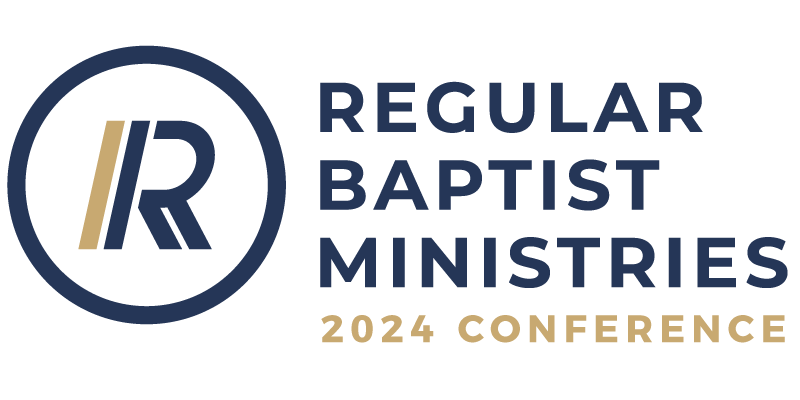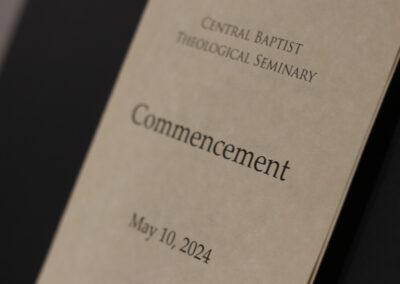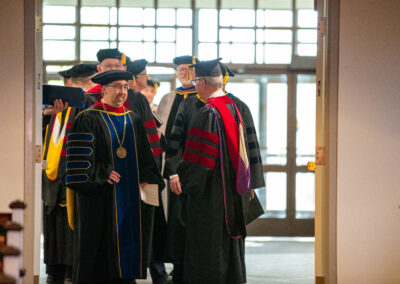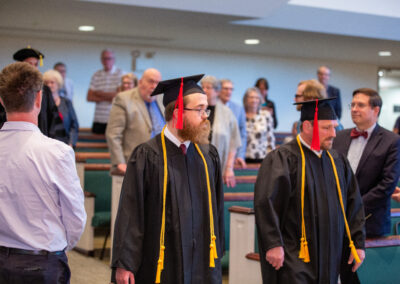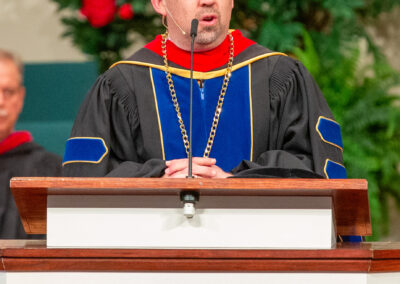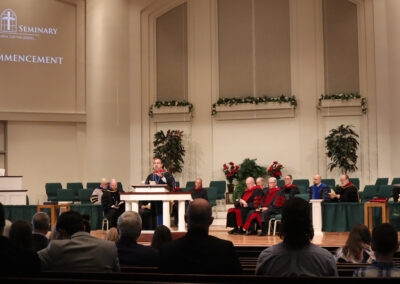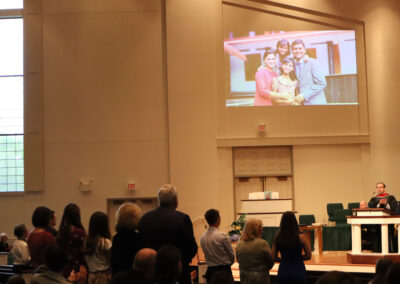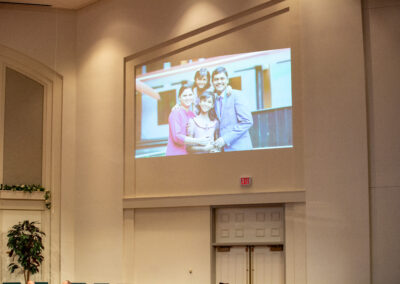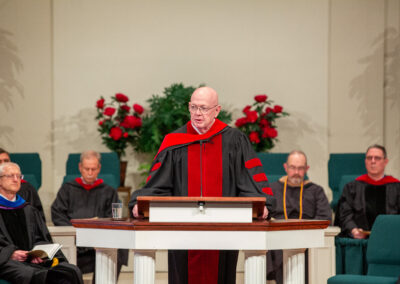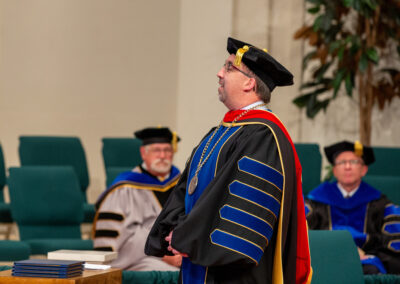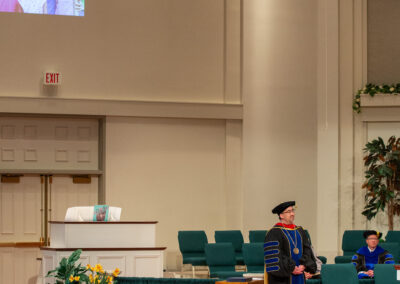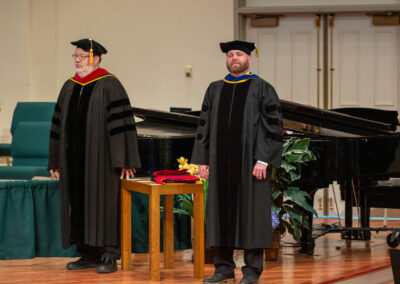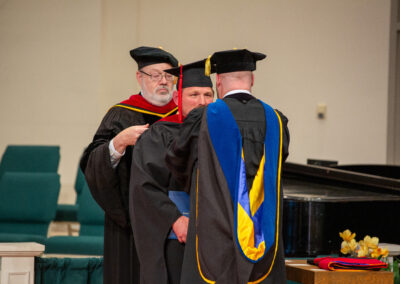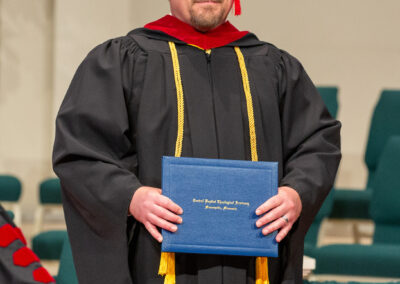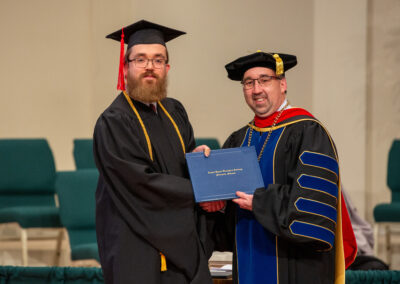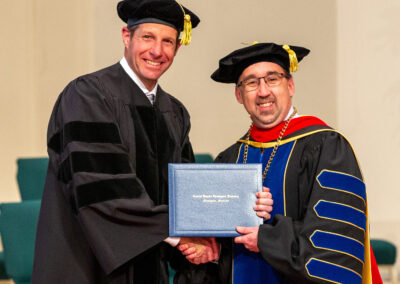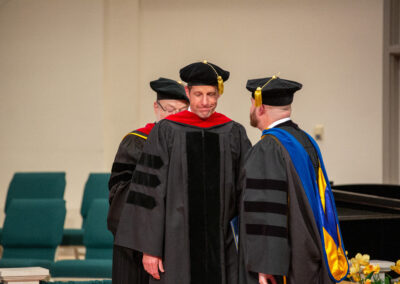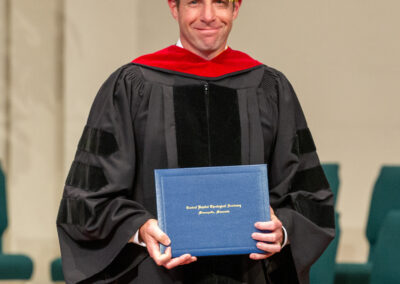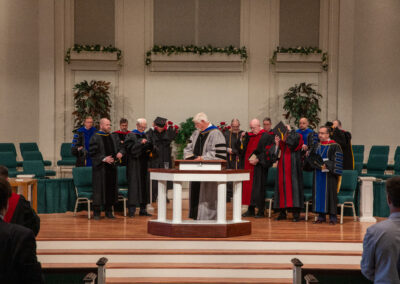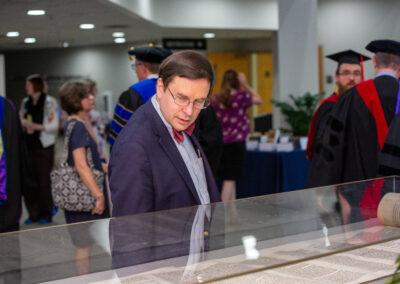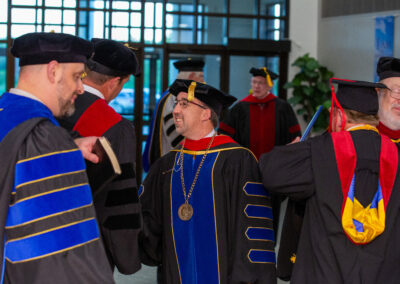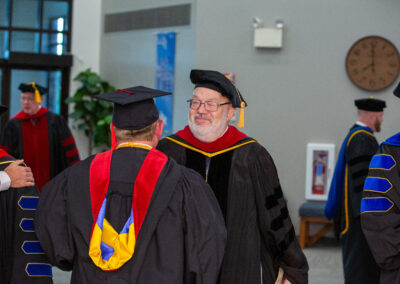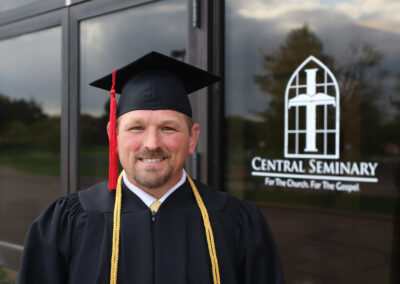Theology Central
Theology Central exists as a place of conversation and information for faculty and friends of Central Baptist Theological Seminary. Posts include seminary news, information, and opinion pieces about ministry, theology, and scholarship.
God, Creation, and Humanity, Part 6: The Devaluation of Nature
During creation week, God brought the world from a relatively lower level of order to a relatively higher level of order. In an unfallen world, humans would have continued this process of ordering creation as God’s sub-regents, exercising dominion and subduing the world. By sinning, however, they brought death into the world, and with death came disorder. Creation has become less responsive to human dominion than it would have been, and humans became less capable of exercising what dominion they still had. Furthermore, they began to exercise it in ways that thwarted rather than fulfilled God’s purposes.
Sinful people think wrongly about God. They think wrongly about themselves. Inevitably, they think wrongly about creation. Wrong thinking about creation takes two broad forms: people either devalue it or they overvalue it.
The devaluation of creation has both ancient and modern forms. One ancient form was Gnosticism, which saw the material world not as the creation of a benevolent God but as the product of a stupid and ill-willed Demiurge. People who have been influenced by Gnosticism tend to view material creation as evil and not good. This judgment extends even to their own bodies. If materiality is bad, then embodiment is bad, and all bodily functions such as eating and procreation are also bad.
Full-blown Gnosticism arose during the Second Century. It was condemned early by Christians, but it continued to exert an influence. Its effects still linger in an attenuated form. The result is that, even though Christians may not see creation and ordinary life as evil, some of them dismiss it as worthless. They denigrate ordinary life, and especially the ordinary pleasures of life. These people tend to see overt devotion and evangelism as the only rightful pursuits for Christians. In their minds, whatever is not explicitly religious is at least suspect and probably sinful. Perhaps certain pleasures (such as the joys of the table or the marriage bed) cannot be avoided altogether, but they ought not to be sought. Activities such as reading fiction, playing games, or listening to non-religious music are seen as a form of idleness and are better avoided in favor of explicitly spiritual pursuits such as singing hymns, visiting the afflicted, and reading the Bible. They tolerate instruction in the interest of understanding the Bible, but learning for its own sake is frowned upon.
For such people, the beauties of nature may (perhaps) be enjoyed but not pursued. In fact, these people view the natural world largely in terms of its utility. They tend to be interested in creation only as a thing to be manipulated to meet their needs. Land that cannot be farmed or mined or built on they do not see as good or useful. They discipline themselves to spend all their time productively, and they believe that nature must be similarly disciplined. The created world is seen largely as an obstacle to be overcome. Wetlands are for draining. Rivers are for damming and bridging. Forests are for logging. People who think this way exhibit little interest either in appreciating the immediate beauty of creation or in grasping the intricacies of its interconnectedness.
The denigration of creation also takes a more modern and secular form. In this secular form, a utilitarian view of the natural world is twisted and amplified by two factors. One is a turning away from the concept of God. The ancients—even the Gnostics—still believed in some sort of God or gods who would ultimately hold them accountable. Modern people have jettisoned this prejudice. Secular people may believe in God, but their professed beliefs no longer exert significant influence over their daily choices. Even if they believe that God exists, they behave as though He had no interest in their activities. They are not so much atheists as they are un-theists.
This shift to un-theism means that people no longer see the natural world in connection with God or with any sort of a divine order or purpose. Everything becomes here-and-now, and they lose any sense that they will ever be held accountable for their use of the created world. In a word, they are free to destroy and pollute wherever and whenever it serves their purpose.
By itself, the harm that stems from this change in attitude would be slight if it were not for a second change. That second change is industrialization, or the ability to use machinery to produce on a large scale. Industrialization amplifies the damage that people can do to the created order. A single person casting a net could never overfish the oceans, but enough people with diesel-powered trawlers could. A single blacksmith heating iron over his fire is not likely to change the air quality, but a series of foundries can. A farmer spreading manure in his field will not cause algae blooms in nearby lakes, but all the farmers spraying industrial fertilizers on their crops will.
Unfortunately, secularization and industrialization virtually coincided in the West. The moment when people were losing their sense of inward restraint was the same moment in which they were overcoming outward obstacles. They became less inhibited about damaging the created order (and each other) at the very time when they gained the ability to do more damage than ever before.
Secular industrialization held sway from the mid-to-late Nineteenth Century until the final third of the Twentieth. This was a period of tremendous technological expansion, resulting in everything from skyscrapers to automobiles to labor-saving devices in every home. Those were also the years when skies were filled with smog and rivers with pollutants—not to mention the years when weapons of unimaginable terror were unleashed in wars of unparalleled scope.
The predations of secular industrialization could not be sustained. The image of God is hardwired in humans, and God’s image-bearers cannot stand to live in permanent disorder. By the 1960s, even secular industrialists were coming to understand that they had to clean up their mess. By the 1970s they had begun this process, and by the turn of the millennium many of the environmental effects of secular industrialization had been reversed.
In the process, however, something happened to the environmental movement. What started as an effort to clean up the mess turned into the equal and opposite error. Instead of denigrating the created order as they had for so long, people began to deify it. That shift has led to even more calamitous results, as we shall see in subsequent discussions.
![]()
This essay is by Kevin T. Bauder, Research Professor of Historical and Systematic Theology at Central Baptist Theological Seminary. Not every one of the professors, students, or alumni of Central Seminary necessarily agrees with every opinion that it expresses.
Heralds of Creation
James Montgomery (1771–1854)
Heralds of creation! cry—
Praise the Lord, the Lord most high;
Heaven and earth, obey the call,
Praise the Lord, the Lord of all.
For he spake, and forth from night
Sprang the universe to light;
He commanded,—nature heard
And stood fast upon his word.
Praise him all ye hosts above,
Spirits perfected in love;
Sun and moon, your voices raise;
Sing, ye stars, your Maker’s praise.
Earth from all thy depths below
Ocean’s hallelujahs flow;
Lightning, vapor, wind, and storm,
Hail and snow, his will perform.
Birds on wings of rapture soar,
Warble at his temple-door;
Joyful sounds from herds and flocks,
Echo back, ye caves and rocks.
High above all height his throne;
Excellent his name alone;
Him let all his works confess.
Him let all his children bless.

Missions as Church Planting
[This essay was originally published on November 2, 2007.]
Historic Baptists agree that the work of missions is the work of planting churches. They derive this conviction from the uniform pattern of the New Testament. When the churches of the New Testament commissioned and sent out a member, it was invariably either to plant churches or to assist someone who was planting churches.
If the New Testament pattern holds, then a missionary’s work is not primarily to educate the ignorant, to feed the hungry, to heal the sick, to seek justice for the oppressed, or to engage in other works of mercy. These works are incidental to missions. While such works may be useful in facilitating church planting, and while they may be performed as fruits of the individual missionary’s Christian compassion, they are not properly the work of missions, and they should never be allowed to displace the work of missions.
Who, then, is a missionary? Properly speaking, a missionary is a church planter. The missionary’s responsibility is to preach the gospel, baptize those who profess the gospel, train believers in the faith, and organize them into New Testament churches. If Timothy and Titus may be used as examples (there are some differences), the missionary’s responsibility is not complete until the churches are fully ordered and self‐perpetuating.
The work of the missionary involves a much broader range of responsibility than the work of the local pastor. As church planters, missionaries must master the same biblical and theological content that a pastor has to know, but they also must excel as witnesses for Jesus Christ. They must be able, with minimal resources, to organize a functional church. In the case of foreign missionaries, they must normally be able to communicate well across cultural and linguistic barriers. The work of missions has an exponentially higher level of difficulty than the work of a pastor at home—though this in no way demeans the work of the pastor!
If a man cannot pastor a church at home, is he really qualified to be sent as a church planter? And how does anyone know whether he can pastor a church at home unless he has actually done it? Clearly, Barnabas and Saul had significant experience in local church leadership before they were sent out on their first missionary journey. Why should the modern missionary be less qualified?
American churches have typically taken the attitude that men who cannot function in ministry at home can be sent to the mission field. The formula has been simple. On the one hand, the most qualified men are called to the most prestigious churches at home. On the other hand, the least qualified men are sent into places where their commissioning churches only have to see them every four years.
Within the Lord’s vineyard, no work is more challenging than the work of missions. If it is as important as everyone says, then shouldn’t the best and brightest be encouraged toward the mission field? More specifically, shouldn’t the bulk of missionaries be drawn from men who have proven themselves in the work of the pastorate?
This suggestion raises a question about current missionary practices. Is it compatible with the “missionary call” about which so many make so much?
The answer to this question is that the New Testament does not seem to teach such a thing as a distinctive and lifelong call to missions per se. One can make an argument (though this is not the place to make it) that the New Testament does imply a calling to what is sometimes referred to as “vocational ministry.” In order to justify the notion of a lifelong call to a specific area of service, however, a biblical interpreter must engage in considerably more theological gymnastics. In fact, the New Testament undermines such a notion, for it shows men moving not only from one specific ministry to another but also from one kind of ministry to another.
When modern Christians refer to “vocational Christian service,” they include several different areas of ministry. They include New Testament ministries such as pastors, missionaries (church planters), and itinerant preacher‐teachers. They also include certain responsibilities that support these New Testament ministries, such as theological teachers and coordinators of infrastructural organizations. These supporting ministries grow out of particular functions of New Testament pastors or missionaries, and are generally regarded as “vocational ministry” even though they are not biblical offices. For example, a theological professor or a coordinator of a mission agency is usually said to be “in the ministry.”
Individuals are often led from one responsibility to another during the pursuit of their ministries. The same person may be a pastor at one time, a missionary at another, and a seminary professor at still another. A missionary may move between fields, and a pastor may move from one church to another. Nothing in the New Testament indicates that a person who moves between areas of service is somehow betraying the call of God upon his life. If anything, the New Testament pattern favors such moves.
Theologically, no reason exists for not insisting that men be tried and proven before they are sent to the mission field. Practically, many factors should motivate churches and mission agencies to ask candidates to prove themselves in ministry before going to the field. Among these are the years of travel that candidates will spend in deputation, the high price of establishing a new missionary on the field, and the heavy toll that first‐term ministry takes on new missionaries and their families.
The work of missions is one of the most vital aspects of New Testament Christianity. Churches that do not plant churches are failures as churches. Missions is too important to do in a shoddy or slipshod way. It is a work for the best and brightest of those who are called to minister.
![]()
This essay is by Kevin T. Bauder, Research Professor of Historical and Systematic Theology at Central Baptist Theological Seminary. Not every one of the professors, students, or alumni of Central Seminary necessarily agrees with every opinion that it expresses.
Happy the Church, Thou Sacred Place
Isaac Watts (1674–1748)
Happy the church, thou sacred place;
The seat of thy Creator’s grace;
Thy holy courts are His abode,
Thou earthly palace of our God.
Thy walls are strength, and at thy gates
A guard of heavenly warriors waits;
Nor shall thy deep foundations move,
Fixed on His counsels and His love.
Thy foes in vain designs engage;
Against His throne in vain they rage;
Like rising waves with angry roar,
That dash and die upon the shore.
Then let our souls in Zion dwell,
Nor fear the wrath of men or hell;
His arms embrace this happy ground,
Like brazen bulwarks built around.
God is our Shield, and God our Sun;
Swift as the fleeting moments run;
On us He sheds new beams of grace,
And we reflect His brightest praise.

God, Creation, and Humanity, Part 5: The Consequences of Sin
God made humans as mediatorial rulers to rule over creation. In the beginning, God made the world at a relatively lower level of order. Throughout creation week, He brought it to higher levels of order. At the end of the week, He delegated the task of further ordering creation to humans, placing the entire world under their feet (Heb 2:8a). The created world can never truly flourish without human oversight.
Nevertheless, as the writer to the Hebrews notes, humans are not presently exercising their dominion in anything like its complete form (Heb 2:8b). While vestiges of human mastery survive, the world is not flourishing. Rather, it is filled with disorder, pain, and death.
The reason for this disparity is described in Genesis 3, the story of the fall. In the original creation (Gen 1–2), God placed humans on probation. This probation consisted of a single prohibition: they must not eat fruit from the tree of the knowledge of good and evil (Gen 2:17). If they did eat of that tree, they would immediately pass under sentence of death.
This prohibition seems odd. Why forbid a piece of fruit? The answer lies in the significance of the tree.
On the one hand, it was a literal tree. It had literal fruit (not an apple!) that could be viewed, plucked, and eaten. At this level, God’s prohibition acted as a blunt test of obedience. To obey, humans must abstain from the fruit. To eat was to disobey God’s law and consequently to become treasonous rebels against the king who had appointed them as His mediatorial rulers.
On the other hand, the tree pointed to something more than itself. Its name implies its significance: it was the tree of the knowledge of good and evil (bad). The “bad” in this designation contrasts with the “good,” and the “good” must be understood in context. Throughout creation week God declared that what He had made was good. How was it good? Not in the sense of moral rectitude, but in the sense that everything God made was useful and beneficial—specifically for humans.
Only once did God say that something was “not good” (Gen 2:18): it was not good for the man to be alone. In other words, God perceived a void or deficiency in His creation. A good was absent. God helped the man to see the deficiency by having him classify or name the animals. This was an exercise in comparison that led the man to realize that he was one of a kind. Then God put the man to sleep, and from the man He made a woman, whom He brought to the man. The man’s reaction was ecstatic, recognizing the oneness between himself and the woman (Gen 2:23). The implication is that when the creation lacks a good, God can be trusted to supply it.
This episode provides a context for the temptation in the garden. The tree of the knowledge of good and bad was not only a literal tree but also a representative case. For humans to eat the fruit would mean that they had chosen to understand or define good and bad for themselves rather than to trust their Creator. This act would represent not only a rejection of the Creator’s law but also an attack upon His very character. Humans would be announcing that their Maker was untrustworthy, and that they were rejecting His provision of the good so they could choose the good for themselves.
When the first couple ate the fruit of the tree, they were declaring independence from God. But God is life, and to become independent of Him was to separate themselves from the source of life. How could the consequence be anything less than death?
The results of that first sin were both widespread and devastating. Two results are of special importance here. First, human sin brought death into the created order (Rom 5:12). Because humans were God’s mediatorial rulers with dominion over the world, the world was changed by human sin. It now “groans and travails” until the second coming of Jesus, when it will be restored (Rom 8:19–23). In the meanwhile, destruction, suffering, and death pervade creation. Sin has introduced a very large element of disorder into the world.
This disorder reaches into the human body itself. The first sin brought the sentence of death, and with death came everything that leads to it: debility, decay, disease, dementia. As Paul says, “even we ourselves groan within ourselves, waiting for the adoption, to wit, the redemption of our body” (Rom 8:23). This penalty has descended upon the entire human race.
The second result of the fall affects human character, which has become twisted. As God’s vice-regents, unfallen humans were created in untried, mutable holiness. They were capable of sin but disposed toward God. Since the fall, their disposition has been reversed. They intuitively reject God, and because they reject God they cannot rightly accept those who are made in God’s image. Here is the origin of what poet Robert Burns called “man’s inhumanity to man.”
Many and sharp the numerous ills
Inwoven with our frame;
More pointed still, we make ourselves
Regret, remorse and shame;
And man, whose heaven-erected face
The smiles of love adorn,
Man’s inhumanity to man,
Makes countless thousands mourn.
As Paul puts it, humans are now “filled with all unrighteousness, fornication, wickedness, covetousness, maliciousness; full of envy, murder, debate, deceit, malignity; whisperers, backbiters, haters of God, despiteful, proud, boasters, inventors of evil things, disobedient to parents, without understanding, covenantbreakers, without natural affection, implacable, unmerciful: who knowing the judgment of God, that they which commit such things are worthy of death, not only do the same, but have pleasure in them that do them” (Rom 1:29–32).
Every aspect of human nature has been subverted so that all people are now totally depraved. While they are still capable of natural good and not yet as evil as they could be, they nevertheless think, feel, and choose wrongly toward God. In their rebellion against God, they also think, feel, and choose wrongly toward each other and, indeed, toward the created order itself. They have become predators, exploiters in the bad sense of that term. Worst of all, they find ways to wrap their predation in the garments of virtue. They make themselves feel good about their destructive choices.
Consequently, human dominion faces a double problem. The first part of the problem is that much of the created order has slipped out of the human grasp, so that creation revolts against humans. The second part of the problem is that they too often view the created world (including each other) either as a thing to be pillaged for the satisfaction of their fallen appetites or else as a God-substitute to be worshipped in His place. Whether there is a solution to this problem will be the topic of a future essay.
![]()
This essay is by Kevin T. Bauder, Research Professor of Historical and Systematic Theology at Central Baptist Theological Seminary. Not every one of the professors, students, or alumni of Central Seminary necessarily agrees with every opinion that it expresses.
Deep Are the Wounds Which Sin Hath Made
Anne Steele (1717–1778)
Deep are the wounds which sin hath made
Where shall the sinner find a cure?
In vain, alas, is nature’s aid,
The work exceeds all nature’s power.
Sin like a raging fever reigns,
With fatal strength in every part;
The dire contagion fills the veins,
And spreads its poison to the heart.
And can no sovereign balm be found?
And is no kind physician nigh
To ease the pain, and heal the wound,
Ere life and hope forever fly?
There is a great physician near,
Look up, O fainting soul, and live;
See, in his heavenly smiles appear
Such ease as nature cannot give!
See in the Savior’s dying blood
Life, health, and bliss, abundant flow!
‘Tis only this dear, sacred flood
Can ease thy pain and heal thy woe.
Sin throws in vain its pointed dart,
For here a sovereign Cure is found;
A cordial for a fainting heart,
A balm for every painful wound.

God, Creation, and Humanity, Part 4: Why God Made Humans
The creation account of Genesis 1–2 is indispensable for a right understanding of both God as creator and the world as His creation. It is also essential for a right understanding of human beings in relation to both God and the created world. What the Bible teaches is that humans have something in common with God, but they also have something in common with creation.
What they have in common with creation is that humans are creatures, like birds, stones, trees, and stars. If they are creatures, then they are not God. They are not absolute. They are not ultimate. Their being, purpose, and nature does not and cannot exist in themselves. They are the handiwork of someone greater and wiser than they. Someone else has designed them, and their design fits within an even larger design. Human beings can expect to find their fulfillment and joy only in completing their design within the great design.
Human ability to complete their design within creation, however, hinges on what they have in common with God. Yes, people are like other created things in important ways. In other ways they are more like God: out of all His creatures God has made them in His own image and likeness (Gen 1:26–27).
What is God’s image and likeness in humans? The answer to this question is widely disputed. Nevertheless, the verses that narrate the creation of the human race (Gen 1:27–28) offer a clue. Verse 27 offers two descriptions of how God created humans: (1) in His image and likeness, and (2) as male and female. Verse 28 then expresses two blessings that God placed upon humanity: (1) to reproduce and fill the earth, and (2) to subdue the earth and exercise dominion over it. In this structure, being made as male and female is what enables humans to reproduce and fill the earth. Being made in God’s image is what enables them to subdue it and exercise dominion. In other words, exercising dominion is a large part of what it means for humanity to be made in God’s image.
This point is enlarged by David in Psalm 8. In view of the immensity of the universe, David asks why God should even pay attention to humans. His answer is that God has made humans a little lower than ’elohim; He has crowned them with glory and honor (5). Specifically, God has made them “to have dominion over the works of thy hands; thou hast put all things under his feet” (6). Commenting on Psalm 8:6, the writer to the Hebrews observes that if God put all things under their feet, then God left nothing in creation outside of human dominion (Heb 2:8).
This dominion over creation is no light thing: God authorizes humans to “subdue” the created world. The term translated subdue (kavash) is a strong word. It means to enslave or to dominate. It is used of Israel conquering the land of Canaan (Num 32:22; Josh 18:1). It is also used of Haman attempting (as Ahasuerus believed) to rape Queen Esther (Esth 7:8). The word has the idea of wrestling someone into compliance against that person’s wishes.
This is the authority that God has given humans over the earth. Evidently, the original creation as it came from the hand of God remained unfinished. God created the world at a relatively lower level of order (Gen 1:1) and then brought it to a relatively higher level of order. Even so, parts of the created world were not yet as God intended them to be. Rather than arranging those parts Himself, God made humans responsible to bring increased order into the created world.
God’s plan was never to govern the world immediately. Rather, He created intermediaries who would do the work of governing on His behalf. He intended to fill the world with these God-like creatures who would continuously bring creation to higher and higher levels of order. These creatures would not have the power to create out of nothing, but they would have the ability to take the pre-existing materials of the world and to arrange those materials so as to force them to become more useful.
Human beings are those God-like creatures. They are created in God’s image and likeness. They are created to exercise dominion everywhere and over everything within the created world. Nothing on planet earth is exempted from their authority.
Not only do humans have dominion over the whole world, but the world is also made for the benefit of humans. God created the heavenly bodies for signs, seasons, days, and years (Gen 1:14), but only humans tell time. God made trees that were pleasant to look at and good for food (Gen 2:8). Both humans and animals consume fruit for food, but human beings are the only creatures who can derive pleasure from gazing upon the beauties of creation.
At a later point, God even gave humans explicit permission to kill animals for food (Gen 9:3). In other words, human dominion includes the authority to use and even to displace other parts of creation in the interest of human flourishing. This point cannot be emphasized too strongly: God never intended the created world to be preserved in pristine condition. He always meant it to be ordered, arranged, and used by humans, without a priori restriction.
Since humans are made in God’s image, they also have one other privilege. They have the capacity to enjoy their relationship with the Creator. They are granted the blessing of being able to listen to “the voice of the Lord walking in the garden in the cool of the day” (Gen 3:8). Of all God’s creatures, they alone are more than servants. They are made to trust God, to obey Him, and to commune with Him. As later Scripture expands on this point, it shows that humans are made to treasure God’s perfections and His presence, reflecting praise back to Him in a relationship of worship.
To be made in the image of God, then, is to be oriented in two directions. On the one hand, it involves trust in, submission to, and worship of the Creator. On the other hand, it involves the exercise of dominion over creation, subduing it so that it reaches greater order and utility for human flourishing.
Worship and dominion are the core of the image of God. Humans stand as mediatorial rulers—kings and queens—over God’s world. To damage either worship or dominion is necessarily to damage both, and that is exactly what has happened. God’s image-bearers have rejected their obligation to trust, submit to, and worship Him. Consequently, their exercise of dominion has been severely hampered, though it has not been removed. Understanding how sin has damaged dominion will require another discussion, this one centering on the fall.
![]()
This essay is by Kevin T. Bauder, Research Professor of Historical and Systematic Theology at Central Baptist Theological Seminary. Not every one of the professors, students, or alumni of Central Seminary necessarily agrees with every opinion that it expresses.
O Splendor of God’s Glory Bright
Ambrose (340–397); tr. Louis Benson (1855–1930)
O Splendor of God’s glory bright,
from Light eternal bringing light,
O Light of light, light’s living Spring,
true Day, all days illumining.
Come, very Sun of heaven’s love,
in lasting radiance from above,
and pour the Holy Spirit’s ray
on all we think or do today.
And now to Thee our pray’rs ascend,
O Father, glorious without end;
we plead with sov’reign grace for pow’r
to conquer in temptation’s hour.
Confirm our will to do the right,
and keep our hearts from envy’s blight;
let faith her eager fires renew,
and hate the false, and love the true.
O joyful be the passing day
with thoughts as pure as morning’s ray,
with faith like noontide shining bright,
our souls unshadowed by the night.
Dawn’s glory gilds the earth and skies,
let Him, our perfect Morn, arise,
the Word in God the Father one,
the Father imaged in the Son.
Central Travels: Bible Faculty Summit & BFA
During the summer months, our faculty have the opportunity to travel to conferences and gatherings to fellowship with pastors, students, and faculty from sister institutions.
Several faculty members recently took part in the Baptist Fellowship Association Annual Conference in Florida and the 2024 Bible Faculty Summit in Wisconsin.
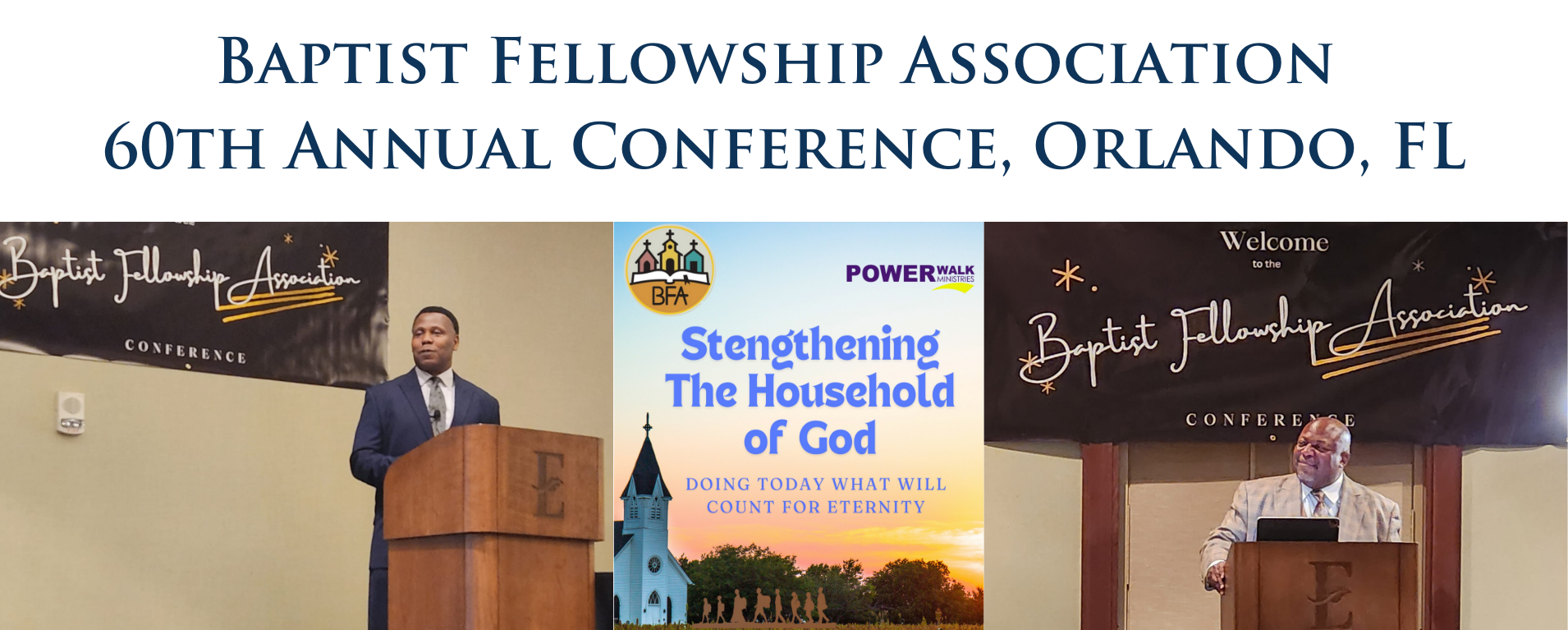
BFA Annual Conference in Orlando, Florida
Strengthening The Household of God, Ephesians 4:11-16
Dr. Brett Williams and family traveled to Orlando, Florida to attend the 60th Annual Conference of the Baptist Fellowship Association and share the ministry of Central Seminary.
In preparation for the conference, BFA President Milton Kornegay wrote “The theme of this year’s conference Strengthening the Household of God will do justice to the rich heritage and strong doctrinal stand of the BFA by presenting to you sermons and Bible teaching centered around that theme. Each sermon and the Bible teaching shared in each workshop and general session will emphasize the majesty of our great God as we look specifically at His Son, Jesus Christ, and how the Trinity works in our lives to heal, encourage, and strengthen us mentally as we engage in spiritual warfare.”
Dr. Williams presented a session entitled “Strong Families Make Strong Children” and had the privilege of talking with prospective students and pastors. Central is thankful for several close connections with the BFA through Dr. Nicolas Ellen, Visiting Professor of Biblical Counseling, and Dr. Victor Clay, Central Board Member.
Dr. Clay serves as the Senior Pastor of Dynamic Life Baptist Ministries in Kansas City and Executive Director of the Baptist Fellowship Association. Victor spoke in two PowerWalk Sessions on the topics of Church Development (“Ministry Planning and Goal Setting”) and Leadership (“Developing a Training Program for Training Leaders to be Biblical Leaders”), along with the Tuesday Evening General Session on “Strengthening the Household of God: The Mystery of Godliness” from 1 Timothy 3:14-16.
Central’s Co-Director of Biblical Counseling, Dr. Nicolas Ellen, spoke in the PowerWalk Sessions on Counseling, with discussions on Designing and Developing an Effective Counseling Ministry, General Principles for Developing Effective Counseling Skills, and Developing a Premarital Counseling Program. The Annual Conference concluded with a banquet on Wednesday night with Dr. Ellen giving the closing address.
Dr. Ellen serves as the Senior Pastor of Community of Faith Bible Church in Houston, Texas, and Senior Professor of Biblical Counseling at the College of Biblical Studies in Houston.
Audio from the general sessions and workshops will be available soon on the BFA website.
Learn more about the BFA at www.bfa.today.
The purpose of the Fundamental Baptist Fellowship Association shall be to promote the establishment of Bible believing Baptist churches of like faith through means of encouragement, fellowship, and financial support; to foster the spirit of evangelism; to spread the Gospel; to advance the cause of Christ through mutual efforts in Christian education and missions – both at home and throughout the world; to promote the institution of the family; and to maintain a pure testimony of Jesus Christ by separation from worldliness, modernism and apostasy. (Matt. 28:19, 20)
Prospective students and pastors from churches of the Baptist Fellowship Association are eligible for a tuition scholarship from Central Seminary to assist in continuing education. Contact info@centralseminary.edu to learn more about the BFA Tuition Scholarship.
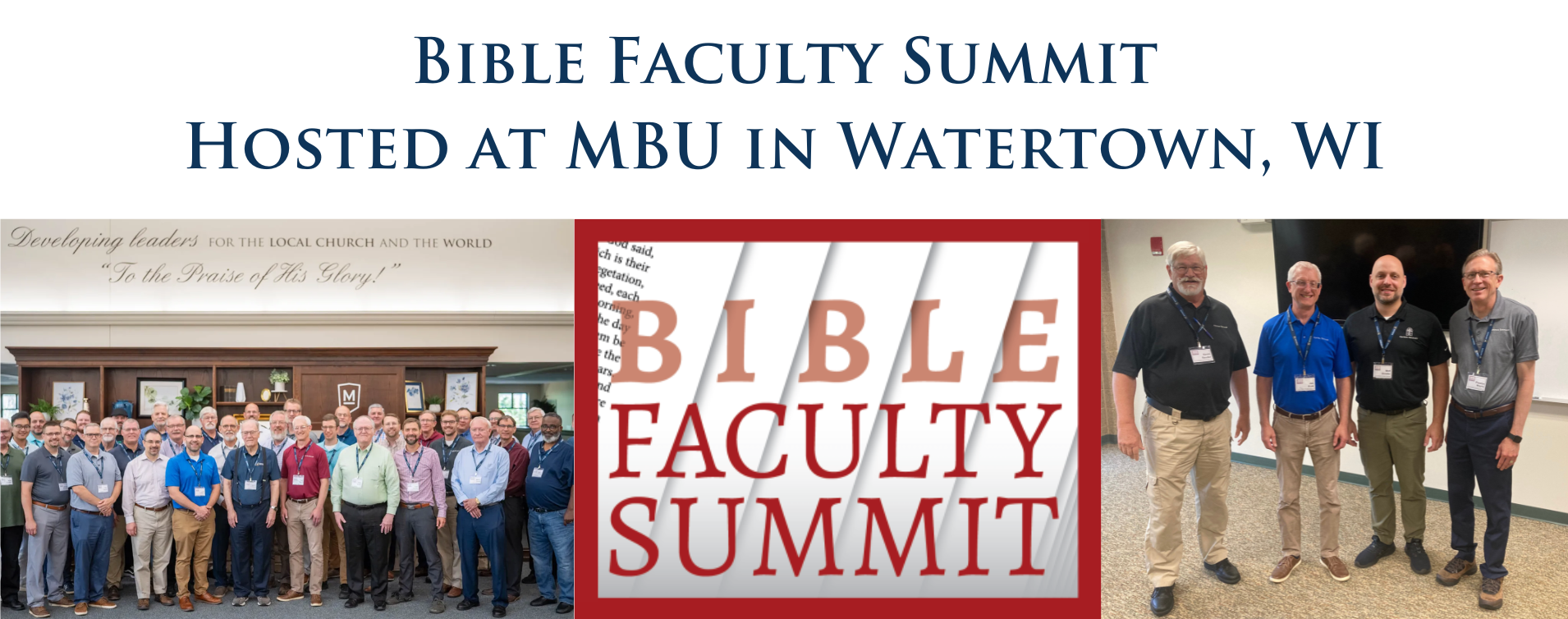
2024 Bible Faculty Summit in Watertown, WI
“Educators Promoting Scholarship in Service of the Church”
The Bible Faculty Summit is an annual event that brings together Bible teachers and seminary professors from a variety of colleges and seminaries and is a highlight of the summer travel season for our faculty to rekindle friendships and hear of new studies in theology. This year’s gathering was hosted by Maranatha Baptist University in Watertown, WI.
The purpose of the Summit is to promote scholarship in service of the church, providing a forum since 1995 for academic reflection, scholarly engagement, and mutual edification among those in Bible teaching ministry. Faculty spend the time hearing papers and discussing them, while enjoying fellowship with fellow Bible teachers.
Central Seminary was represented at the Summit by Drs. Matt Shrader, Jon Pratt, Kevin Bauder, and Preston Mayes. Dr. Shrader also had the opportunity to present a paper entitled: “‘A Ministry of Enlarged Culture’: Characteristics of the First American Baptist Seminaries.”
The Summit concluded with a call for papers for the 2025 BFS which will be held at Bob Jones University in Greenville, SC.
Published papers from past summits are available online at https://biblefacultysummit.org/published-papers/

Indefensible Dispensationalism
[This essay was originally published on October 12, 2016.]
Dispensational theology has gone out of style. Fifty years ago, probably a majority of American evangelicals held some version of dispensationalism. Today, the balance has tilted in the opposite direction. Not only are dispensationalists in the minority, but their system is widely viewed as indefensible, sometimes even by former dispensationalists.
Some of the reasons for this shift are theological. For example, the inaugurated eschatology of Geerhardus Vos and George Eldon Ladd did much to redefine certain key questions about the kingdom of God. Dispensationalists have responded in different ways: some have rejected inaugurated eschatology, while others have adapted their dispensationalism to accommodate it. The effect, however, is to make dispensationalism seem less plausible than it did half-a-century ago.
Other reasons for the shift are social. Dispensationalists have rarely been trained in the most respectable universities and seminaries. They have not typically published through the most academically reputable book houses. Some important evangelical schools like Westminster Theological Seminary have historically opposed dispensationalism. Other traditional seminaries have simply ignored it. In short, dispensationalism has been a commoners’ approach to the Bible, a theology that grew up on the wrong side of the tracks. Few within the theological establishment are impressed with its pedigree.
Political forces also play into the decline of dispensationalism. Its adherents are almost always pro-Israel, and they are not always careful to distinguish either ethnic or national Israel from the modern state of Israel. Obviously, people who have greater sympathy for the Arab world, and especially for Palestinian Arabs, look askance at the tendency of some dispensationalists to grant almost unqualified support to the current Israeli regime.
Some of the most important reasons for the decline come from within dispensationalism itself. Dispensational theology exists simultaneously in two overlapping but distinguishable worlds. One is the world of academic dispensationalism, in which Bible teachers are motivated primarily by the desire to understand the biblical text and to explain it to the Lord’s people with precision and care. The other is the world of populist dispensationalism, dominated by television and radio personalities, prophecy wonks, film producers, and novelists. The first has been the world of Alva McLain, John Walvoord, Erich Sauer, Charles Ryrie, and John C. Whitcomb. The second is the world of A Thief in the Night, Hal Lindsey, Nicolae Carpathia, and John Hagee.
Many non-dispensationalists make the mistake of thinking that the popularizers represent all of dispensationalism. They do not. In fact, many academic dispensationalists find the popularizers’ presentations quite distasteful. At least four behaviors of popular dispensationalists tend to provoke chagrin from committed, thoughtful dispensationalists.
The first is the tendency to convert eschatology into a source of amusement. Eschatology—the biblical study of last things—is a precious field of doctrine, intended to buttress the perseverance of believers even under the most difficult circumstances. Consequently, eschatology should be an ongoing object of reflection and rejoicing for every Christian. But how can this area of doctrine receive proper consideration when it is turned into a plot device for action adventure movies and apocalyptic thrillers? No doubt the film-makers and novelists believe that they are communicating biblical doctrine to thousands who would otherwise remain unenlightened. In reality, they are trivializing biblical doctrine.
Second is a penchant on the part of some popularizers to mix up their dispensationalism with other weird and unbiblical teachings. For example, John Hagee has opined that Hitler was a distant descendent of Esau, one of a race of “half-breed Jews” who have “persecuted and murdered the Jews” (Jerusalem Countdown, 185). Certainly Hagee is not the only person who has held this theory, but publishing this kind of unsubstantiated speculation is the sort of thing that brings dispensationalism into disrepute.
Third, populist dispensationalists typically allow their dispensationalism, and especially their eschatology, to overbalance the rest of the system of faith. Prophecy becomes such an obsession with them that other important biblical teachings are neglected. To be sure, populist dispensationalists believe all the fundamentals of the faith, but such core doctrines as the Trinity, the hypostatic union, and the nature of the atonement seem to occupy their attention much less frequently than (e.g.) the identities of certain prophetic figures. To minds that have been steeped in the full teaching of the Bible, this doctrinal disproportion resembles an arm or leg that has become so swollen as to disfigure the body that supports it.
Fourth, populist dispensationalists exhibit an unfortunate enthusiasm for finding prophetic fulfillments in the latest newspaper headlines. These fulfillments are taken to indicate that the Rapture is not only imminent, but actually immediate. An imminent Rapture is one that could occur at any moment, but that might not occur for a long time. An immediate Rapture is one that is almost certain to happen very soon. The strength of historic dispensationalism is that it affirms imminence while carefully specifying that the actual timing of the Rapture is not even approximately knowable.
The reason for stressing imminence is that the Bible names no prophetic signs that need to be fulfilled before the Rapture can occur. Consequently, the Lord’s people are to be expecting it at any moment. They should always be ready to meet the Lord.
Some populist dispensationalists, however, do believe that signs precede the Rapture. They are looking for cosmic and social upheavals as well as dramatic rejections of Christianity. For them, every occurrence of such events becomes a prophetic fulfillment indicating the immediacy of the Rapture. Recently, they have taken to talking about what they call “the convergence of signs,” meaning that bunches of biblical prophecies are being fulfilled all at once. For them, this means that Jesus is (virtually?) certain to rapture His church in the very near future.
The Bible offers no signs of the Rapture. Any supposed sign is one that somebody either made up or else twisted away from a proper reading of Scripture. The constant drumbeat of supposed fulfillments exposes dispensationalists to ridicule. It also wears down the saints with disappointment. This variety of dispensationalism truly is indefensible.
I’ve been a dispensationalist since before I knew what the word meant. I can remember looking over my father’s shoulder at the notes of his Scofield Reference Bible. Every couple of years my pastor would stretch a huge, Larkinesque dispensational chart across the auditorium, and he would teach through all the dispensations. While I don’t agree with every wrinkle of Darby, Gaebelein, Scofield, or Larkin, I believe that dispensationalism is an eminently defensible approach to the Bible. Except for those versions that aren’t.
![]()
This essay is by Kevin T. Bauder, Research Professor of Historical and Systematic Theology at Central Baptist Theological Seminary. Not every one of the professors, students, or alumni of Central Seminary necessarily agrees with every opinion that it expresses.
Comfort, Comfort Ye My People
Johann Olearius (1611–1684); tr. Catherine Winkworth (1827–1878)
Comfort, comfort ye my people,
speak ye peace, thus saith our God;
comfort those who sit in darkness
mourning ‘neath their sorrow’s load.
Speak ye to Jerusalem
of the peace that waits for them!
Tell her that her sins I cover,
and her warfare now is over.
Yea, her sins our God will pardon,
blotting out each dark misdeed;
all that well deserved His anger
He will no more see nor heed.
She hath suffered many a day,
now her griefs have passed away;
God will change her pining sadness
into ever-springing gladness.
For Elijah’s voice is crying
in the desert far and near,
bidding all men to repentance,
since the kingdom now is here.
O that warning cry obey,
now prepare for God a way;
let the valleys rise to meet Him,
and the hills bow down to greet Him.
Make ye straight what long was crooked,
make the rougher places plain,
let your hearts be true and humble,
as befits His holy reign;
for the glory of the LORD
now o’er earth is shed abroad,
and all flesh shall see the token
that His Word is never broken.

God, Creation, and Humanity, Part 3: The Created World
The opening verse of the Bible has profound implications for a right understanding of God. Its implications for a right understanding of the created world are just as significant. Together with the following chapters, it provides a necessary and adequate foundation upon which humans can erect their view of creation.
The course plan for Foundations of Right Thinking 101 is very simple: God made the world. The created order is His handiwork. He is the Creator. The world and all that is in it are His creatures. They owe their existence to Him. God is eternal. Creation is not. God is infinite. Creation is not. God is absolute. Creation is not. God exists in and from Himself. Creation does not.
The world had a beginning. Once upon a time it did not exist. Then it did. Had God not chosen to create it, the world would never have been. It might not have been. Its existence depended entirely upon God’s good pleasure. Its ongoing existence depends upon the sustaining activity of God. As the writer to the Hebrews states, God the Son is the person who is “upholding all things by the word of his power” (Heb 1:3). The apostle Paul adds that in Christ, “all things consist” or hold together (Col 1:17). The existence of the created order is contingent and derived.
The world is not God. Nothing in the world—no created thing—is God. No combination of created things can ever become God. Therefore, no created thing, and no combination of created things, must ever be worshipped. Such things must never be assigned an importance that is equal to or greater than God. They must never be accorded the kind of devotion that God alone deserves. To worship any created thing is to become an idolater.
People worship created things whenever they treat those things as if they were valuable in themselves. The true value of each created thing depends upon its connection to something greater than itself. Ultimately, the value of the whole created order is contingent upon its connection to God. Creation as a whole, and each created thing in particular, is always a means to an end. Only God is the end, the goal, the telos. If we detach any created thing from its proper role in serving God, and if we begin to treat any created thing as if it were somehow an end in itself, separately from or even alongside God, then we turn that thing into an idol. We worship it.
We must love God with all our heart, soul, mind, and strength because there is one and only one true and living God (Mark 12:28–34). Since creation is not God, we must never love any created thing with all our heart, soul, mind, and strength. We must love creation only insofar as we can love it in connection with and service to the God who it was made to serve.
The world is finite, time-bound, and contingent. Nevertheless, it is good. It is good because He who made it is good. It is good because the Maker, reviewing His handiwork, pronounced it good. In the narrative of Genesis 1, God declares His creation to be good no less than seven times. The last, seventh time, He declares it to be very good. Humans must never treat the created order as if it were evil. Neither should they denigrate God’s good creation as if it were unworthy of their attention and involvement. When, on the seventh day, God rested (Gen 2:2–3), He was not “resting up” as if He could be tired of creating. Rather, He was delighting Himself in the goodness of all that He had made. For humans to refuse to acknowledge and appreciate the goodness, beauty, and utility of the created world is to despise the Creator. This, too, is idolatry.
Those who make things leave their marks upon the things that they make. Similarly, God has left the impress of His person upon His poiema—the things He has made (Rom 1:19–20). Even though God Himself is spirit and invisible, His work as Creator makes certain aspects of His character obvious within the created world. These include His eternal power and His theiotēs or divine nature. This stamp of God’s character means that people do not even have to reason backward from creation to Creator; instead, they confront the personhood of the Creator by merely living and breathing in the world. For human beings, not knowing God is not possible, even if they reject that knowledge and invent alternative explanations (Rom 1:21–25).
God’s creation of the world was not meaningless, random, or arbitrary. God had a purpose in creation, and everything He made tends toward that purpose. The creation narratives repeatedly use the language of purpose. When God declared creation to be good, it had to be good for something. Specifically, the celestial lights are for seasons, days, and years. The sun and the moon are supposed to govern day and night. God gave herbs and fruit for food. God placed humans in the garden of Eden for a declared purpose.
The meaning and purpose of the world is not found in itself. It is found in the purpose of the Creator. When the created world is used according to the Creator’s purpose, His creatures will flourish. When it is used contrary to His purpose, their flourishing will be hindered. The word used is important. Creation must be used, and not merely enjoyed, because its purpose is fulfilled in right use. But it must be used rightly, and that right use is tied directly to the presence of humanity within the created order.
To understand the meaning, function, and use of creation, then, one must understand God’s creation of humanity. One must understand where God has placed humans within the created order, and one must grasp the role that God has given humans to fulfill. Consequently, having discussed God and creation, we must next turn attention to the nature, purpose, and destiny of human beings.
![]()
This essay is by Kevin T. Bauder, Research Professor of Historical and Systematic Theology at Central Baptist Theological Seminary. Not every one of the professors, students, or alumni of Central Seminary necessarily agrees with every opinion that it expresses.
Praise the Lord! Ye Heavens, Adore Him
Richard Mant (1776–1848)
Praise the Lord! ye heavens, adore Him,
Praise Him, angels in the height;
Sun and moon, rejoice before Him;
Praise Him, all ye stars of light.
Praise the Lord—for He hath spoken;
Worlds His mighty voice obeyed;
Laws which never shall be broken,
For their guidance He hath made.
Praise the Lord—for He is glorious;
Never shall His promise fail;
God hath made His saints victorious,
Sin and death shall not prevail.
Praise the God of our salvation,
Hosts on high His power proclaim;
Heaven and earth, and all creation,
Laud and magnify His name.

God, Creation, and Humanity, Part 2: The God of Creation
Nothing is more fundamental to right thinking than the first sentence of the Bible: “In the beginning, God created the heaven and the earth.” These words, supplemented by the following description, claim that God made the entire created order from the furthest galaxy to the tiniest subatomic particle. This order is what people call the world.The Bible draws a distinction between God, who is outside the world and who exists before it, and the world, which God brings into existence at a point in time (arguably, the point that begins time).
God made the world, but no one made God. He simply is, and there was never a time when He was not. He is the world’s past, present, future, but He is altogether outside of time. He is, and He is what He is. He exists in the fulness of His being, owing His existence to nothing outside Himself. His existence flows necessarily from His own being: He could not not be.
Just as God exists outside of time, He also exists outside limitations of space. He is infinite and immense. He is everywhere present in all that He has made, and wherever He is, He is present in the fulness of His being. God is all that He is in all places where He is, and He is everywhere.
God’s power is such that He brought the universe into being by the mere exertion of His will. His power is without limit. Like all His attributes, His power is His own. He never receives power from anyone or anything else, never depends on anything outside Himself, never grows tired. While He does nothing that contradicts His nature, and while He never engages in absurdities (such as willing Himself not to exist), He will never fail to be able to do anything that can be done.
Importantly, the maker of the world is God, and not the gods. Jehovah alone is God, and no one else is like Him. He alone has power to create. He alone has exercised this power. He alone is worthy of worship by His creatures. Thus, the Shema (Deut 6:4) also stands as a fundamental assumption in all correct thinking: “Hear, O Israel: The LORD our God is one LORD.” This key verse leads directly to another, the Greatest Commandment, “And thou shalt love the LORD thy God with all thine heart, and with all thy soul, and with all thy might,” (Deut 6:5). There is one and only one true and living God, and His creatures owe Him absolute devotion.
This true and living God is profoundly personal. We cannot quite affirm that He is a person, for He is three persons: Father, Son, and Holy Spirit. Each of these three is true God, possessing the entire divine nature and all the divine perfections. Yet the Father is not the Son, the Son is not the Spirit, and the Spirit is not the Father. Each of these three communes with the others, and each delights in the others. These three persons in one God are eternally satisfied in each other, such that God never was nor ever could be lonely or in need of companionship.
For this reason, God did not create the world out of any necessity. He did not need the world so that He could somehow become more than He is. He was not and could not be compelled to create. His making of the world was done freely. He has never explained His reason for creating, except for that recurring phrase in Ephesians 1: according to the good pleasure of His will.
Because all that is in the world is God’s creation, and because matter came to be as part of that creation, God cannot be a material being. He cannot even be of the same substance as created spirits such as angels or the human soul. God is entirely incorporeal. He possesses no bodily parts. He is driven by no passions.
His impassibility does not mean that God is unfeeling. For example, He is good, and He is good in two senses. First, He is infinitely benevolent, purposing the wellbeing of His creatures. Second, He is infinitely holy, righteous and just, a moral lawgiver to His creatures and a moral judge over them. He is faithful to reward the righteous, and He always responds to injustice with wrath (Rom 2:5–10).
This vision of God stands in contrast to at least three great errors. The first error is polytheism, the belief in multiple gods. Polytheistic systems cannot account for the existence of the world. Just as importantly, they cannot account for the existence of the gods. Furthermore, polytheists invariably depict their gods as larger versions of humans, with all the weaknesses, idiosyncrasies, and blunders that humans are prone to commit. In polytheism, some form of the world must exist before the gods can be brought forth. The gods are the creation of the world process, not the other way around. The Old Testament prophets repeatedly mocked polytheism, and the apostle Paul challenged it directly in his address to the Areopagus (Acts 17).
The second error is dualism, which posits two eternal principles or gods of more-or-less equal ultimacy. The most notorious dualism to plague the Christian church was Gnosticism, which combined an ethical and metaphysical dualism with a version of polytheism. In Gnosticism, the world is the creation of an obtuse, malevolent offspring of the offspring of the gods, and the material world is intractably evil. Gnostic ideas did not mature until after the end of the New Testament era, but they were present and growing during the lives of the apostles. The New Testament writers challenge incipient Gnostic teachings in several places.
The third great error is pantheism, which sees the divine as immanent within all creation while it denies God’s transcendence. In pantheism, God is not a person but a personification of the world. It (for in pantheism God can only be it and not he) is identical with the great world process itself. Personhood is simply an illusion that emerges from that process and that eventually is reabsorbed into it. The word God is kept for its evocative power, but “God” is really nothing but whatever is and whatever happens. Pantheism is represented in most Eastern religions and in some Western philosophies. The biblical writers rarely address it directly, but everything they say about God contradicts it.
If we want to understand the world, ourselves, and our sin rightly, then we must begin with a right vision of God. Accepting this vision is not a purely intellectual decision. We are not allowed simply to presuppose God. We must trust Him, the God of the Bible, the personal-infinite Spirit who made us, loves us, and judges us. We must trust Him, and we must fear Him. We can offer Him our trust and fear because He is not only our maker and judge but also our redeemer. A discussion of redemption, however, must follow the discussions of creation, humanity, and sin.
![]()
This essay is by Kevin T. Bauder, Research Professor of Historical and Systematic Theology at Central Baptist Theological Seminary. Not every one of the professors, students, or alumni of Central Seminary necessarily agrees with every opinion that it expresses.
God Is My Strong Salvation
James Montgomery (1771–1854)
God is my strong Salvation;
What foe have I to fear?
In darkness and temptation
My Light, my Help is near.
Though hosts encamp around me,
Firm to the fight I stand;
What terror can confound me,
With God at my right hand?
Place on the Lord reliance,
My soul, with courage wait;
His truth be thine affiance,
When faint and desolate.
His might thy heart shall strengthen,
His love thy joy increase;
Mercy thy days shall lengthen;
The Lord will give thee peace.

God, Creation, and Humanity, Part 1: Beginning a Conversation
When we think wrongly about God, we necessarily begin to think wrongly about other things, too. When we feel wrongly toward God, we inevitably feel wrongly toward other things. When we choose against God, we direct our wills such that making wrong choices about other things becomes unavoidable.
How we think about God determines how we think about ourselves. It determines how we think about creation and our role in it. It determines how we think about sin and its effects. No wonder that A. W. Tozer opened his book, The Knowledge of the Holy, with this sentence: “What comes into our minds when we think about God is the most important thing about us.”
The process also works in the other direction. If we think about creation wrongly, we shall begin to think of God wrongly. Wrong thinking about ourselves or about our sin will also lead us into wrong thinking about God. Indeed, one reason that people reject the true and living God is because they entrench themselves in false beliefs about self, sin, and the world—beliefs that they are not willing to surrender. Where our bad thinking starts does not matter. Wrong ideas about any of these areas will corrupt our thinking in all the other areas because these areas are connected.
The devil, God’s greatest enemy, knows about this connection. He wants people to misunderstand who God is. He also wants them to misunderstand themselves, their sin, and the world in which they live. He further knows that if he can lead people astray in any one area, then the other areas are sure to follow. Consequently, he varies his strategy depending upon the situation. Sometimes he directly assaults our concept of God. Sometimes he attacks our vision of the created order. Sometimes he undermines our understanding of human nature. Sometimes he subverts our comprehension of sin and its effects. Wherever he starts, his goal is to sell us a package of lies that corrupts our entire moral vision.
Believe it or not, the devil and his demonic agents plan how they are going to subvert people’s thinking. Ephesians 6:11 warns against the wiles of the devil. The word for wiles is one that means stratagems or schemes. Apparently, the devil and his spiritual operatives sit around thinking of ways in which they can deceive people about God, creation, humanity, and sin. Perhaps the demons even hold committee meetings where those strategies are discussed and refined. Their strategies can be quite sophisticated: James talks about a demonic wisdom that is earthly and sensual, one that results in human bitterness and fighting.
The demons also get help from human agents in transmitting these false teachings. According to the apostle Paul, certain false teachers pay attention to seducing spirits and doctrines of demons (1 Tim 4:1). These teachers sometimes repeat demonic teachings even when they know that they are false. Unbelievably, for reasons of their own, these hypocrites are willing to lie about teachings that they know to be untrue (1 Tim 4:2). Sometimes these false teachers even start out as professing Christians, but they later depart from the faith. Even after they apostatize, they try to leverage their former standing among Christians to convince God’s people that their demonic teachings are true.
The power of these demonic strategies lies in the connectedness of biblical ideas about God, creation, humanity, and sin. The devil’s schemes work because these areas of thinking cannot be sequestered from each other. Instead, they depend upon one another. For example, the false teachers of 1 Timothy 4 attacked biblical teaching about creation by denying its goodness, insisting that people should abstain from foods that God had made. They also tried to undermine a biblical understanding of humanity by attacking the institution of marriage, which (besides being part of the created order) is fundamental to God’s purpose for the human race (1 Tim 4:3). Paul responded by defending the goodness of God’s creation (1 Tim 4:4–5), and no wonder: the goodness of creation is tied directly to the goodness of the Creator who made it.
Paul was responding to a particular demonic stratagem. It was a stratagem that would multiply into many erroneous systems of thought, some explicitly pagan and others professing to be Christian. These demonic teachings would endure for centuries to come. Indeed, some manifestations of this stratagem are still with us today (more about those later). Paul’s point, however, was not simply about one particular form of error. Rather, he was working from a vision in which teachings about God, creation, humans, and sin stand at four corners of a great theological quadrilateral. To bend any corner is to warp the whole quadrilateral and to distort all of the other corners.
What I want to do over the next several essays is to examine each of the corners individually. I will begin by looking at the biblical understanding of God—not exhaustively, but insofar as it affects our thinking about creation and humanity. Then I will explore a doctrine of creation, followed by a biblical vision of humans within creation. I will ask how sin has changed both the created order and human involvement in it. Then I will try to bring all four corners together to articulate a vision for human activity under the Creator God in a sin-damaged creation. Once I have done that, I hope to explore a couple of specific ways in which this vision can be skewed by misunderstandings of God, creation, human nature, and sin.
This essay—the one that you are reading right now—functions as a kind of preface to the whole series. I am not yet sure how long the series may go. It will certainly get interrupted occasionally along the way. But I encourage you to keep track of the argument week by week. I believe that some of the thorniest problems in Western civilization today—and in the Western Church today—arise out of ways in which demonic teachings have warped the quadrilateral. So keep reading.
![]()
This essay is by Kevin T. Bauder, Research Professor of Historical and Systematic Theology at Central Baptist Theological Seminary. Not every one of the professors, students, or alumni of Central Seminary necessarily agrees with every opinion that it expresses.
From All that Dwell Below the Skies
Isaac Watts (1674–1748)
From all that dwell below the skies,
Let the Creator’s praise arise;
Let the Redeemer’s name be sung
Through ev’ry land by ev’ry tongue.
Eternal are thy mercies Lord;
Eternal truth attends thy Word;
Thy praise shall sound from shore to shore
Till suns shall rise and set no more.

Acton University
The last week of June, I had the opportunity to attend Acton University for a second time. Acton University is not really a university but a week-long conference held in Grand Rapids, Michigan. It is sponsored by the Acton Institute, and its focus is represented by the tag line, “Connecting good intentions with sound economics.”
The Acton Institute is a conservative think tank. It is not explicitly a religious organization, though it involves mostly religious people of some sort. At any rate, it recognizes that political, social, and economic thinking are closely joined with theological thinking, and it invites theological discussion insofar as theology affects those areas of human flourishing.
One of the first principles of conservatism is the belief that politics and economics cannot be uncoupled from transcendent morality, and that moral behavior ultimately rests upon a moral vision. The thinkers at Acton University do not all share the same religion. Many are Catholic. Some are from various Protestant traditions, from Anglican to Reformed to Wesleyan. Some are Jewish. A few are even Muslim. None is prepared to put aside her or his religion for the sake of the conversation, and none is willing to demand that any other do so. Consequently, conservative social, political, and economic principles are examined from multiple theological perspectives, leading to a more robust understanding of how those principles can be articulated in ways that transcend religious divides.
My week at Acton University was funded through the Kern Family Foundation, established by the founders of Generac Power Systems. My daughter and son also obtained funding through the Kern Foundation (one has a PhD in music and the other a PhD in Medieval philosophy), as did my daughter’s husband (PhD in philosophical theology). Consequently, the week was not only a time of instruction and intellectual challenge, but also a time of strengthening family ties.
The hospitality at Acton University is magnificent. The conference hotel is first class and the meals are delightful. Non-classtimes are structured to promote conversation. One breakfast I found myself at a table with an editor from Reason Magazine. At another breakfast I was joined by a professor from Cedarville University. Other meals were eaten with attendees from a variety of African and Asian nations. I shared table talk with the leaders of several political and religious institutions. Acton University encourages these conversations to strengthen the bonds between people from around the world who hold conservative beliefs.
Tuesday through Thursday, there were two teaching sessions each morning, then two more each afternoon. The two sessions I enjoyed most were both taught by Ryan Anderson, author of When Harry Became Sally—one of the very few books to be outright banned by Amazon because of its opposition to transgender ideology. Anderson is always highly articulate and quite entertaining. His first session was on “The Use and Abuse of Anti-Discrimination Law: On Private Property and the Free Exercise of Religion.” The second was on “Social Justice and Economic Rights,” in which Anderson argued that it is possible to articulate a meaningful vision of social justice that does not capitulate to Leftist or Identity Politics. Stephen Barrows had a good session on “Population and Migration in the Modern World” in which he argued that one of the world’s chief dangers at this moment is depopulation and that migration can be part of the solution to that problem. Economist David Bahnsen (son of the late theologian Greg Bahnsen) presented an interesting study on “Debt, Crowding Out, and Economic Growth.” Jordan Ballor had a very good presentation on “An Introduction to Abraham Kuyper’s Public Theology.” This last was of special interest because, while Ballor clearly identified as Kuyperian, he tended to distance himself from the Christian Reconstructionists.
Speaking of Abraham Kuyper, the Acton Institute has commissioned an English translation of his twelve-volume “Collected Works in Public Theology.” The translation is being done in connection with Lexham Press. I do not know whether the entire series has been completed, but at least several volumes are available. I see this as a valuable reference for both Christians and conservatives.
The week was not without its difficulties. All three of my immediate family members got sick during the week. My son and daughter seemed to recover apace. In my case, I ended up with an infection that (after I returned home) required both a trip to the dentist for a root canal and a trip to urgent care for narcotics. By the way, I am genuinely grateful that God has put opioids in His creation, and that He has given humans the ability to refine them. Used in the proper way, they are far preferable to blinding pain. I ended up taking two of my dozen or so tablets; they did the trick in a way that over-the-counter pain relievers could not.
I’ve attended Acton University for two years now. Both years have been excellent experiences. Both have helped me to learn how to articulate a range of moral and social issues. I am grateful to the Kern Foundation for its funding. You do not need to go to Acton University, however, to take advantage of its expertise. Use a good search engine (I recommend DuckDuckGo, which will not track you or sell your data) to find the Acton Institute, and then explore its resources. It has a trove of materials that will be useful to pastors who are trying to engage moral issues.
![]()
This essay is by Kevin T. Bauder, Research Professor of Historical and Systematic Theology at Central Baptist Theological Seminary. Not every one of the professors, students, or alumni of Central Seminary necessarily agrees with every opinion that it expresses.
The Ten Commandments
Isaac Watts (1674–1748)
1. Thou shalt have no more Gods but me.
2. Before no idol bow thy knee.
3. Take not the Name of God in vain:
4. Nor dare the Sabbath–day profane.
5. Give both thy parents honour due.
6. Take heed that thou no murder do.
7. Abstain from words and deeds unclean:
8. Nor steal, though thou art poor and mean.
9. Nor make a wilful lie, nor love it.
10. What is thy neighbor’s dare not covet.

Thinking About Immigration
The immigration policies and procedures of the United States are a mess. Anyone who has had to deal with the department of Immigration and Customs Enforcement knows that this agency is unpredictable to the point of seeming arbitrary. It sometimes feels like a Third World agency, except that bribery cannot solve the problems. Legal visitors and immigrants face inexplicable obstacles, while we simultaneously face an illegal immigrant population of somewhere north of ten million people.
When Democrats are in office, Republicans like to blame them for the “immigration crisis.” The fact is, however, that Republicans have done no better than Democrats at solving this problem. I suspect that it cannot be solved without an overall reconstruction of ICE, its policies, and its procedures.
The problem is exacerbated, however, by those on the Left who appear to favor completely open borders. Armed with silly slogans like, “No human is illegal,” these folk appear to want the USA simply to capitulate to anyone who cares to cross the border. Such a philosophy, however, would prove highly destructive.
The USA has an interest in keeping terrorists and criminals on the other side of the border. There have been constant rumors of some countries emptying their jails and sending their convicts onto American soil. Certainly we have seen horrifying instances of illegal immigrants committing horrifying crimes.
This is not to say that all immigrants are criminals—far from it! Nevertheless, by definition, those who enter the USA in violation of immigration laws are guilty of a misdemeanor under the criminal code. Those who simply outstay their visas or remain for other reasons are also in violation of the law, but the penalties are civil rather than criminal in nature.
Too Left Evangelicals assume that the Old Testament required Israel to welcome all immigrants and to treat them on an equal basis. This is not true. The law and prophets recognize a distinction between a ger (a resident alien who obtains permission to live in the land) and a nekhar or zar, who are foreigners who simply show up, not really intending to put down roots. These categories are treated differently, with different privileges and protections. All are required to submit to Israel’s law while in the land. But Israel did not welcome the Philistines when they showed up as unwelcome invaders, nor did Israel welcome invasion from other groups. It is not unreasonable to suggest that an illegal immigrant is really an invader.
There is no easy solution to the problem of burgeoning and often illegal immigration, but several changes might help to redefine this problem. First, we should recognize that immigration is not the problem. Indeed, as the USA approaches a demographic cliff, immigration is part of the solution to other problems. We ought to welcome immigrants who are qualified to contribute to our society, and we should also be committed to helping others reach a point at which they can contribute. Let me say it again: immigration in itself is not a problem—it is a solution. Republicans in particular ought to push for ways to expand the number of qualified, legal immigrants who enter the country.
Second, to open the door to these legal immigrants, we need to revise the culture and procedures of ICE. There need to be more officials who hear immigration cases, and they should be trained in a welcoming perspective. Granted, background checks still need to be done—but these are being done already. Yet in some cases it takes years before an immigrant (whether legal or illegal) can actually get a hearing, and the amount of red tape to enter the country legally is truly appalling.
Third, we need structures to help integrate immigrants into American civilization. Citizenship should be a goal for all immigrants, and one of the duties of immigrants should be to complete courses in American civics (and I don’t mean the kind of courses that Critical Theorists would like to offer). There may be room for voluntary organizations to take over some of this task. We need to look actively for ways to prevent immigrants from simply reproducing the cultures of their home countries within the USA. It’s fine if they want to keep their language and customs, but they must at least be willing to contribute to the larger orbit of the civilization around them.
Fourth, while holding the door wide open for legal immigration, we need to slam it shut on the illegal variety. The Border Patrol should be enhanced, and state and local law enforcement should be empowered to enforce immigration laws. I can understand why an immigrant would become frustrated with the present situation, and why that person might try to circumvent an arbitrary and unwieldy process. If we streamline the process, however, we may rightly insist that only legal immigrants will be allowed to stay, unto the third and fourth generations.
I recognize that the foregoing is not a developed, careful policy recommendation. It is not meant to be. It is intended as a series of generalized ideas to try to move us past the present crisis. Both parties—all American citizens—have an interest in solving the problem of immigration. If you don’t think that these proposals will work, feel free to suggest your own. But we have reached the point at which we need to do more than simply complain about the problem.
![]()
This essay is by Kevin T. Bauder, Research Professor of Historical and Systematic Theology at Central Baptist Theological Seminary. Not every one of the professors, students, or alumni of Central Seminary necessarily agrees with every opinion that it expresses.
Stand Up and Bless the Lord
James Montgomery (1771–1854)
Stand up and bless the Lord,
ye people of His choice;
stand up and bless the Lord your God
with heart and soul and voice.
Though high above all praise,
above all blessing high,
who would not fear His holy name
and laud and magnify?
O for the living flame
from His own altar brought,
to touch our lips, our minds inspire,
and wing to heav’n our thought!
There, with benign regard,
our hymns He deigns to hear;
tho’ unrevealed to mortal sense,
the spirit feels Him near.
God is our strength and song,
and His salvation ours;
then be His love in Christ proclaimed
with all our ransomed pow’rs.
Stand up and bless the Lord;
the Lord your God adore;
stand up and bless His glorious name
henceforth and evermore.
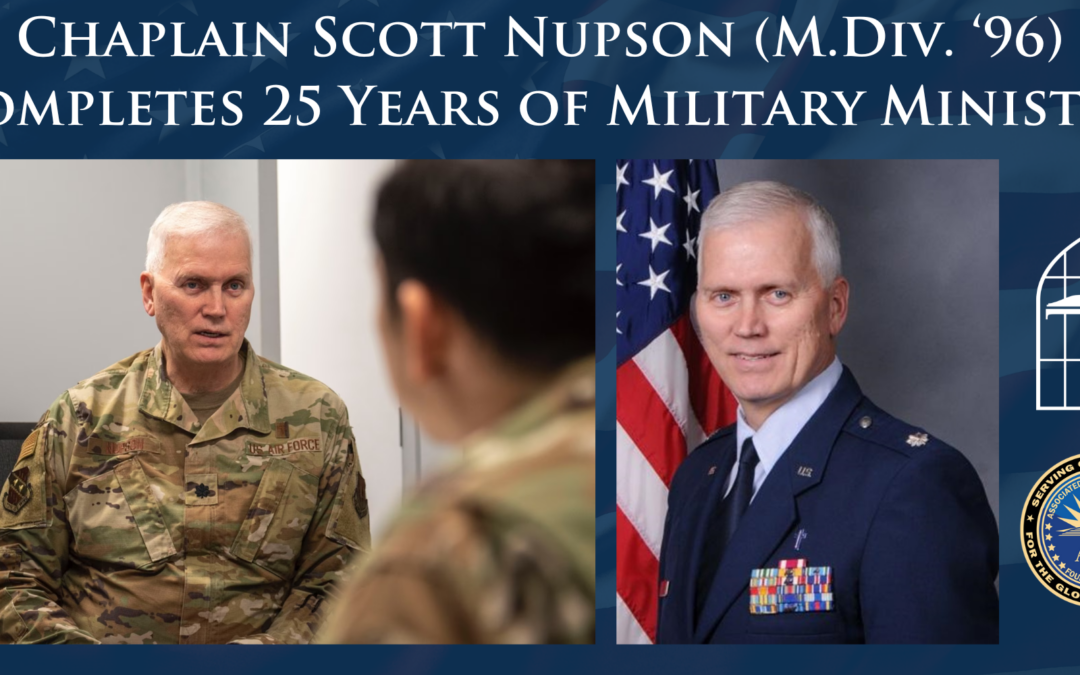
Nupson Completes 25 Years of Military Ministry
From Ch (Lt Col) Scott Nupson, USAF 70th ISR Wing, Fort Meade, MD, in the AGC Newsletter:
“As Ellen and I conclude 25 years of Military ministry, my heart overflows with gratitude for our Lord’s overwhelming goodness and grace. Ellen has been my steadfast partner since day one, passionately joining me in serving our Military members and their families. Our children have walked alongside us in Military ministry, maturing in their faith, and pursuing God’s calling as adults. Words fail to adequately express my gratitude for the privilege of serving as a USAF Chaplain. The blessings we’ve experienced have far exceeded any expectations I held. Every day, God has sent individuals into my path, affording me the privilege to minister to them and share the enduring hope of the Gospel. I pray for all our AGC Chaplains, along with their spouses and children, trusting in God’s power to work through them to impact the lives of those they serve for Christ’s sake.”
Ch (Lt Col) Scott Nupson completed his Master of Divinity at Central in 1996 and was a fully qualified candidate for the Air Force Chaplain School. Scott is endorsed as a chaplain by the Associated Gospel Churches. Scott has a number of Central Seminary family connections with his nephew, Tyler Nupson, currently pursuing a Master of Divinity student at Central, and father-in-law, Dr. Gordon Hanson, brother-in-law, Larry Johnson (Pastor at Grace Baptist, Mankato), and nephews Nathan and Jason Johnson all graduates of Central.
PRESS RELEASE:
After 25 years of faithful service to the Lord through the Air Force Chaplain Corps in the United States Air Force; Chaplain, Lt Col Scott Nupson begins a new chapter of his life in retirement where he plans to spend more time with his family and volunteer at his church. His retirement bio is as follows:

“Chaplain Scott P. Nupson boasts a commendable 25-year tenure as a military chaplain, having been commissioned into service in 1999. He is an ordained Baptist minister endorsed by the Associated Gospel Churches Chaplaincy and has worked full-time in ministry for 31 years.
His career journey began in Grand Forks Air Force Base, North Dakota where he served from 1999 to 2002, followed by a stint at Kadena Air Base, Japan, from 2002 to 2005, with a deployment to the Philippines during this assignment.
Subsequently, he returned stateside to Offutt Air Force Base in Nebraska, serving from 2005 to 2009, including a deployment to Soto Cano Air Base in Honduras. From 2009 to 2014, he assumed the role of Deputy Wing Chaplain at Tinker Air Force Base in Oklahoma, deploying to the U.S. Central Command at MacDill Air Force Base in Florida. His journey continued with an assignment at Wright-Patterson Air Force Base from 2014 to 2015, followed by serving as the Wing Chaplain at Maxwell Air Force Base in Montgomery, Alabama, from 2015 to 2018. Transitioning to the Defense Intelligence Agency at Joint Base Anacostia-Bolling in Washington, D.C., he served from 2018 to 2020, followed by a brief tour in Korea from 2020 to 2021 as the Wing Chaplain at Kunsan Air Base,. Currently, Chaplain Nupson serves as the Wing Chaplain for the 70th ISR Wing at Fort George G. Meade, in Maryland.
Chaplain Nupson’s exemplary service has been recognized with personal decorations including the Defense Meritorious Service Medal, Meritorious Service Medal with two oak leaf clusters, Joint Service Commendation Medal, Air Force Commendation Medal with three oak leaf clusters, Joint Service Achievement Medal with one oak leaf cluster, and various other unit and campaign awards.
Since 1987 Chaplain Nupson has been happily married to the former Ellen Hanson, and together they are blessed with four children: Kyle, Kelly, Kristen, and Kari. Additionally, they have an amazing daughter-in-law, Jozi, and two precious grandchildren: Pippa and Kit”
– Photo & Article: 70th ISRW Chapel on Facebook, May 13, 2024
A Family Journey of Faith and Service
Reflecting on his career, Nupson takes great joy knowing he has helped his fellow Airmen and strengthened them through faith and counseling.
“Being a chaplain is a neat opportunity and a great experience because faith and religion are where people get their spiritual resiliency,” said Nupson. “When that is suffering, and people haven’t exercised their spiritual health, that’s when their struggles and difficulties won’t soften”
I’m grateful that I can help people with their struggles, and provide the service with strong Airmen and families,” said Nupson.
By Eric Sharman, Air University Public Affairs / Published March 05, 2018, Maxwell Air Force Base

On Knowing One’s Limitations
Nobody is omnicompetent. Nobody. At some point, everybody has to rely on somebody else for information, advice, and perspective. The trick is in knowing whom to rely upon.
Most people gain considerable expertise in some one area. I had a friend who was an outstanding delivery driver. He was so good that he eventually was given the job of training other delivery drivers. My brother is a broadcast engineer, and one of my sisters is an emergency physician. Both of them know things that I don’t and probably never will (there won’t be much need for emergency medicine during the Millennium). While I can tinker with cars and make basic repairs, I take my vehicle to a trained auto mechanic. My father-in-law was a farmer, and his experience gave him detailed knowledge of soils, weather, tilling, crop rotation, markets, and polled Hereford cattle. I myself would not be able to earn a living doing any of the above.
My doctor’s degrees do not qualify me to offer advice in matters medical or legal. One doctorate is in systematic and historical theology—I do know a bit about that. The learning that I acquired while earning that doctorate also gives me significant competence in related biblical disciplines, plus a kind of trailing expertise in cognate disciplines such as philosophy and intellectual history. I can also bring the tools of my discipline to bear upon other humanities such as languages, literature, various historical studies, and the liberal arts. My training also provides some tools for criticism in the fine arts, particularly where they overlap with esthetics, as well as a platform for interacting with the social sciences (which are more like humanities than sciences). Other than helping to order the mind, however, my preparation in theology gives me little insight into what have been called the “servile arts” (business, finance, accounting, and related fields), and none at all into the formal, natural, and applied sciences.
You have heard that it has been said that everybody has a right to an opinion. That is not true. The only opinions to which people have a right are informed opinions. An opinion that is not backed by informed perspective is sheer presumption and bigotry. That is why I cannot offer legal and medical advice beyond, “See a doctor,” and, “Talk to a lawyer.” Indeed, if I were to hang out a shingle advertising myself as available for legal and medical advice, I would expect a visit from the authorities rather quickly.
The truth is that what I know is only a drop in the ocean of all that can be known. That’s how it is with all of us. We are forced to rely upon other people who know things that we don’t. We trust people in their areas of expertise. We have to.
Some people want that trust without having earned it. The most egregious offenders are actors and athletes. Actors make their livings by pretending to be what they aren’t. The fact that they can pretend well gives them no qualification whatever to offer observations about any serious matter—unless you consider pretending to be a serious matter. The same is true of athletes. When it comes to the weightier matters of life—the permanent things—why should anyone credit the opinion of a person whose sole contribution to the world is the ability (borrowing Garo Yepremian’s phrase) to “kick a touchdown”?
Other people try to erect alternative frameworks of trust. For example, a person who can’t make it through medical school can still advertise and practice some form of “alternative healing.” Commonly, such a person will claim to possess esoteric knowledge that has been neglected by traditional medicine, while at the same time attempting to call into question the credibility of the medical profession itself. This person’s claims will not typically be backed with rigorous research or double-blind studies, but with ephemeral correlations, anecdotal evidence, and personal testimony. The same sort of mentality in the religious sphere results in cultic thinking. In the political sphere it bolsters conspiracy theories.
Sometimes a figure who has gained credentials that merit trust might abuse that trust. For various reasons, experts might place their reputations at the disposal of political and social forces that promote policies they ought to know are mistaken. Increasingly, it is becoming apparent that key individuals did exactly that in the face of the COVID pandemic. They knowingly withheld vital information and even lied to us while claiming to be following the science. One expert even claimed to be the science. The result is that many people will distrust governmental pronouncements about diseases for a long time to come.
Yet we must trust someone, even if we do it critically. And we ought to know whom to distrust: journalists, shills, demagogues, conspiracists, sensationalists, blogs of all sorts, social media sites, and anonymous sources (including those that start with Q). We must trust, but we ought to try not to be gullible.
![]()
This essay is by Kevin T. Bauder, Research Professor of Historical and Systematic Theology at Central Baptist Theological Seminary. Not every one of the professors, students, or alumni of Central Seminary necessarily agrees with every opinion that it expresses.
Lord, When Thou Didst Ascend on High
Isaac Watts (1674–1748)
Lord, when thou didst ascend on high,
Ten thousand angels filled the sky;
Those heavenly guards around thee wait,
Like chariots that attend thy state.
Not Sinai’s mountain could appear
More glorious when the Lord was there,
While he pronounced his holy law,
And struck the chosen tribes with awe.
How bright the triumph none can tell,
When the rebellious powers of hell,
That thousand souls had captive made,
Were all in chains like captives led.
Raised by his Father to the throne,
He sent his promised Spirit down,
With gifts and grace for rebel men,
That God might dwell on earth again.

Central Travels
Central Travels Update for June
Throughout the year, you may see us at a conference or seminar in your area. This offers a chance to connect with prospective students and our alumni. We’d love to have you stop by. Bring a friend by our booth to learn more about Central Seminary or grab a pen and remember us in prayer.
Some upcoming travels:
For the final week of June we will be at a number of conferences around the country. Catch us at the:
165th Annual Meeting of the Minnesota Baptist Association
Monday-Tuesday, June 24-25 in Plymouth, MN
-and-
IFCA INTERNATIONAL 2024 ANNUAL CONVENTION
Monday-Friday, June 24-28 in Springdale, AR
-and-
2024 REGULAR BAPTIST MINISTRIES CONFERENCE
Monday-Thursday, June 24-27 in Elgin, IL
TOGETHER “The Incredible Value of Biblical Fellowship”
If you’re in the area of one of these events, drop us a note at info@centralseminary.edu.
Do you know of a prospective student? Someone who desires theological education, ministry, or working in their church? Visit this page to refer a student and we’ll contact them.
Thanks for sharing the word about Central Seminary!

The Foundations Baptist Fellowship International 2024
This week I had the opportunity to attend the annual meeting of the Foundations Baptist Fellowship International. The meeting was hosted by the Tri City Baptist Church in Westminster, Colorado, pastored by Will Senn. The meeting began with scheduled training for chaplains on Monday, followed by a general preaching session on Monday night, then other sessions through Wednesday night.
The chaplains’ training was important, since the FBFI is an endorser for chaplains serving under the Department of Defense. In addition to endorsing individuals for military chaplaincy, the FBFI also provides structure and training for people who minister in community chaplaincy (such as police, fire, and hospital chaplains). Since separatist Baptists have few recognized endorsers for chaplains, this is an important function of the FBFI.
The opening session of the conference on Monday night featured Bruce McAllister preaching. McAllister is now the executive vice president at Bob Jones University. His presence at the meeting sends a message from both the FBFI and BJU of their determination to continue a cordial and cooperative relationship. That message was reinforced by the presence of Joshua Crockett, the new president at BJU.
Bob Jones University is not the only institution of higher learning that cooperates or identifies with the FBFI. Central Baptist Theological Seminary regularly has a representative at this meeting. Several other schools were also represented, either on the platform or by exhibits. These included Appalachian Bible College, Baptist College of Ministry, Faith Baptist Bible College and Seminary, International Baptist College and Seminary, and Maranatha Baptist University. Each of the colleges had a musical ensemble at the conference, and on the last night these ensembles combined to form a fair-sized choir.
Several mission agencies also had representatives present at the meeting. These included the Northwest Baptist Mission, Bibles International, Baptist World Mission, Baptist Evangelistic Missionary Endeavors, Baptist Home Missions, International Partnership Ministries, and Baptist Mid Missions, which was represented by its president, Patrick Odle. While Mid Missions is often viewed as a GARBC institution, an increasing proportion of its missionary recruits are coming from other circles, including churches whose pastors fellowship with the FBFI. In their core commitments (Baptist polity, dispensationalism, separatism, and cessationism, to name a few), the FBFI and BMM are virtually indistinguishable.
The FBFI did not ignore the fact that Denver has become a very Hispanic city. Multiple Spanish-speaking churches cooperated as partners in hosting the event. Those churches provided a dinner on the opening night. All songs that night were sung simultaneously in Spanish and English, and McAllister’s sermon was translated from the pulpit as he preached. This struck me as a genuine effort to live up to the “International” part of the FBFI’s name. Perhaps next time a Spanish preacher will be interpreted for the English speakers.
An intriguing aspect of the conference was that most of the preachers were second-generation FBFI members in their twenties or thirties who were introduced to the audience by their fathers. Each preached on an assigned theme related to the specific mountains mentioned in the four gospels. Even though the preaching was thematic, most of these men chose to develop their assigned texts in an expository and even exegetical way. If these young men are any indication, then there is reason for optimism about the future of preaching within Baptist separatism.
In addition to the preaching sessions, the conference featured several other events. One was a chaplains’ session that included the recognition of a key military chaplain and a key community chaplain. Extended afternoon prayer meetings were held separately for women and men. The host church sponsored a chuck-wagon dinner before the Wednesday evening service, complete with Western music and a yodeler. It offered dessert fellowships after the evening services. The day after the conference ended, attendees were given the opportunity to participate in a mountain hike above tree line. Nobody had any excuse for being bored during the week.
The FBFI occasionally presents a “Torchbearer Award” to individuals who have evidenced integrity and who have substantially advanced the Lord’s work over a process of decades. Such recognitions are, I think, appropriate. They are part of rendering honor to whom honor is due. They are part of remembering those who have ministered among us. They neither presume upon nor replace our ultimate judgement at the Bema, but they do allow us to express our gratitude and respect for one another.
This year a Torchbearer Award was presented to Pastor Mike Harding of First Baptist Church in Troy, Michigan. Partly this award honors Pastor Harding for decades of ministry in Troy, but it also has greater significance. Pastor Harding serves on the boards of both the FBFI and Bob Jones University. This conjunction has placed him in an uncomfortable position over the past couple of years, and it has occasionally placed him in someone’s crosshairs. The Torchbearer Award recognizes that, throughout a difficult situation, Pastor Harding has acted at all times with grace, dignity, balance, and charity.
The Foundations Baptist Fellowship International of today still holds the biblical principles that it has held from its founding. It has, however, changed through the years. During the 1920s and 1930s it was a fellowship that worked within a modernistically-dominated convention. During the 1940s and 1950s it led in organizing an entire Conservative Baptist Movement separately from the convention. From the 1960s through the 1980s it could sometimes lack a biblical sense of balance. From the 1990s onward it has positioned itself to become the leading individual fellowship within Baptist separatism. Under its current leadership the FBFI is growing in understanding and in grace, and I am personally grateful for it.
A kindred organization of the FBFI is the New Testament Association of Independent Baptist Churches. While the FBFI is an individual fellowship, the NTAIBC is a fellowship of churches. Several years ago the two organizations met jointly for the first time. Next June 9–11, 2025, the NTAIBC and the FBFI will again meet together at Calvary Baptist Church in Watertown, Wisconsin. That should be a conference worth attending.
![]()
This essay is by Kevin T. Bauder, Research Professor of Historical and Systematic Theology at Central Baptist Theological Seminary. Not every one of the professors, students, or alumni of Central Seminary necessarily agrees with every opinion that it expresses.
Behold, How Good a Thing
Charles Wesley (1707–1788)
Behold, how good a thing
It is to dwell in peace;
How pleasing to our King
This fruit of righteousness;
When brethren in the faith agree—
How joyful is such unity!
Where unity is found,
The sweet anointing grace
Extends to all around,
And consecrates the place;
To every waiting soul it comes,
And fills it with divine perfumes.
Grace, every morning new,
And every night we feel
The soft, refreshing dew
That falls on Hermon’s hill!
On Zion it doth sweetly fall:
The grace of one descends on all.
E’en now our Lord doth pour
The blessing from above,
A kindly, gracious shower
Of heart-reviving love,
The former and the latter rain,
The love of God and love of man.
In Him when brethren join,
And follow after peace,
The fellowship divine
He promises to bless:
His choicest graces to bestow,
Where two or three are met below.
The riches of His grace
In fellowship are given
To Zion’s chosen race,
The citizens of heaven;
He fills them with His choicest store,
He gives them life for evermore.

Those Pesky Premillennialists
[This essay was originally published on July 31, 2009.]
Disagreeing with someone’s perspective is one thing, but dismissing it is something else. People can disagree respectfully. Respectful disagreement involves listening carefully to other individuals in conversations, understanding their positions, and considering carefully the arguments that favor them (or that weigh against one’s own position) before replying. When a perspective is dismissed, however, it is rejected as so implausible—and perhaps so damaging— that it does not warrant a hearing. Dismissiveness is often accompanied with derision.
In certain theological circles, premillennialism, especially in its dispensationalist varieties, is almost habitually dismissed and derided. A recent example involves a sermon preached by a well‐known evangelical pastor. The sermon, which was partly addressed to premillennial pastors, was mainly an exposition of Revelation 20. To be clear, the sermon contained much useful teaching. This influential pastor, however, began his treatment of the text by repeating a quip that Revelation is not “for the armchair prophets with their charts of historical events and their intricate diagrams of the end of the age.” He then continued, “This is not rightly dividing the Word of Truth,” a clear allusion to dispensational theology. He insisted that the purpose of the book of Revelation is to provide “warning and reassurance” to “harassed, subsistence‐level Christians,” to “encourage them in their struggle,” and to “liberate them from fear of the enemy within and without.” In other words, the purpose of Revelation is to hearten persecuted believers, not to disclose details of an eschatological timetable.
Those two activities, however, are not mutually exclusive. Granted, the purpose of the Apocalypse really is to encourage perseverance among believers who are facing oppression. Even so, that does not imply that eschatological chronology or detail is necessarily absent from the book. Indeed, it is at least possible that the details of eschatological chronology might be revealed in order to provide motivation for perseverance.
At this point, a concession is in order. Even if eschatological detail and chronology are important, not every use of these details is necessarily helpful. In fact, two uses of prophetic schematizing are damaging. These uses ought to be an embarrassment to every responsible premillennialist.
One bad use of biblical prophecy is to satisfy mere curiosity about the future. Some people experience a kind of nosiness about things to come. To satisfy this desire, unscrupulous individuals have created an entire occult industry that purports to peer into the future. Some people read biblical prophecy for much the same reason that others read Nostradamus or consult their daily horoscopes. This practice surely misses the point.
A second bad use of prophecy is to turn it into a source of entertainment. Some dispensationalists have invented a literary genre that could be called “prophetic fiction.” In their novels and movies, they surround biblical prophecies with action‐packed story‐telling and extra‐biblical speculation. Treated this way, prophecy becomes fantasy. Some people read Left Behind for much the same reason that others read Harry Potter. Turning prophecy into amusement almost invariably debases it.
Such uses of prophecy are harmful, but they do not count against the suggestion that biblical prophecy reveals eschatological chronology or detail. Whether or not Scripture includes those details can only be determined by examining the Scriptures themselves. If the text actually communicates eschatological chronology and details, then chronology and details must be important and ought to be studied.
Not surprisingly, the dispute over eschatological detail soon turns into a dispute over the proper way of reading prophetic passages. Those who deride eschatological detail often assume that prophetic texts should be read in a non‐literal way. Contrapositively, those who read the texts in a literal way usually affirm the importance of eschatological detail.
The word literal, however, lends itself to misunderstanding. Premillennialists (especially dispensationalists) have sometimes contributed to this misunderstanding by failing to clarify what they mean by their use of the term. Too often, “literal” seems to be opposed to “literary,” disallowing any figurative or symbolic uses of language.
Responsible premillennialists know better. They are fully prepared to grant the multiple levels at which ordinary language communicates. What they are not prepared to concede is that biblical prophecies ought to be read in a way that wholly exempts them from the ordinary use of language. Premillennialists are not prepared to concede that figurative or symbolic uses of language authorize the wholesale spiritualization of prophecy.
Premillennialists—particularly dispensationalists—note that biblical prophecy may be divided into two broad classes. Some prophecies have been wholly and indisputably fulfilled. The fulfillment of other prophecies remains wholly or partly in the future.
The prophecies that have already been fulfilled provide a convenient way of understanding how prophetic language works. By noting how these prophecies were fulfilled, interpreters can develop a hermeneutic for interpreting prophecy. The same hermeneutic may then be applied to unfulfilled prophesy.
If interpreters do engage in that exercise, then what conclusions will they draw? The answer is that they are very likely to become premillennialists. Indeed, this kind of reading is what premillennialists mean by “literal” interpretation. Incidentally, the habit of reading prophetic Scriptures in this way is one of the marks of dispensationalism.
Prophetic chronology and eschatological detail are not antithetical to spiritual encouragement. Interpreters will be able to determine whether prophetic passages include detailed chronology only by studying those passages. As they explore the prophetic, unfulfilled prophecies ought to be understood in the same way in which fulfilled prophecies have received their fulfillment. If prophetic passages, when interpreted in this way, actually do include eschatological details and chronological markers, then those things are part of the whole counsel of God. Whatever is in the Word of God is worthy of being studied, believed, and taught.
So what about charts? Would non‐dispensationalists really be happier if dispensationalists simply refused to use charts? It seems unlikely.
All sorts of people, including theologians, use charts, diagrams, and graphic representations to help them visualize all sorts of things. Biblical geography can be represented cartographically. Greek and Hebrew professors expect their classes to do sentence diagrams. The history of Israel is often taught using charts and diagrams. The relationships of biblical characters can be charted in a family tree. Charts can be very useful in distinguishing doctrines such as redemption, propitiation, and reconciliation.
Many non‐dispensationalist teachers use charts for a variety of purposes. Charts can be used to help people conceptualize geographical, grammatical, historical, genealogical, and soteriological relationships. Why should they not be used to help people conceptualize eschatological ones?
Premillennialists use charts. So what? They see detail and chronology in eschatological passages. So what? They think that eschatological details matter when those details are taught by the Word of God. So what?
None of these considerations constitutes a real objection to premillennialism or even dispensationalism. None of them constitutes a legitimate, prima facie warrant for dismissing premillennial eschatology. A more appropriate response would be to treat premillennialism as a responsible alternative within the theological matrix, even if one must disagree with it.
![]()
This essay is by Kevin T. Bauder, Research Professor of Historical and Systematic Theology at Central Baptist Theological Seminary. Not every one of the professors, students, or alumni of Central Seminary necessarily agrees with every opinion that it expresses.
Behold, the Mountain of the Lord
John Logan (1748–1788); Michael Bruce (1746–1767)
Behold, the mountain of the Lord
In latter days shall rise
Above the mountains and the hills,
And draw the wond’ring eyes.
To this, the joyful nations round,
All tribes and tongues, shall flow:
“Up to the hill of God,” they say,
“And to his house, we’ll go.”
The beam that shines on Zion’s hill
Shall lighten ev’ry land:
The King who reigns in Zion’s towers
Shall all the world command.
No strife shall vex Messiah’s reign,
Or man the peaceful years;
To ploughshares men shall beat their swords,
To pruning-hooks their spears.
Come then, oh, come from ev’ry land,
To worship at His shrine;
And, walking in the light of God,
With holy beauty shine.

Dominion
It was never meant to be easy, this business of exercising dominion. When God blessed the first humans, he gave them the power to fill the earth and to subdue it. Yes, subdue it, like the sons of Manasseh were to subdue the land across the Jordan (Num 32:22), like the children of Israel subdued the promised land (Josh 18:1), like Ahasuerus thought that Haman had tried to subdue Esther (Esth 7:8). To subdue a thing (kavash) is to tread it down, to dominate it, and to bring it into subjection (BDB, sv).
When God created the heavens and the earth, they were formless and empty (Gen 1:1–2). There was order, but it was a relatively lower level of order. Throughout creation week, God brought His world into higher and higher levels of order, and that was good. Nevertheless, the full ordering of the world was not complete at the end of Day Six. God did not finish ordering the world Himself. Instead, He committed that task to the godlike creatures whom He had made for the purpose—human beings.
Humans were made to rule the world. They were made to take dominion. To exercise that dominion, they would have to wrestle the created world into higher levels of order. They would have to subdue it. We were made to rule. We were made to dominate and subdue, and our world was made to be dominated.
Tragically, the work of exercising dominion was subverted by sin. The presence of sin in the world has at least two effects. First, sin has corrupted both our thinking and feeling. We now perceive it as good and right to dominate the created order—including other people—in predatory ways. Second, the order of creation itself has been distorted. God chose not to leave fallen humans in an untouched environment. Now the ground brings forth thorns and thistles. Scarcity has become part of life, which means that acquiring daily food has become a labor. Animals kill each other, and they kill humans, too. We experience fires, floods, earthquakes, storms, and other natural disasters. More than ever, we need to bring order to the world, but the degree of required effort has increased exponentially.
We can make two great mistakes in our present situation. The first mistake is the preservationist mistake: the belief that the best approach to the created order is to leave it alone. On this view, people treat the created world best when they affect it the least. The summum bonum would be to let the world function with minimal human interference. Indeed, some versions of this theory see humanity as a disease upon the planet, and a few of them are only too ready to see the human race eradicated.
The preservationist view tends to ally itself with religions that deify nature. Various forms of animism, shamanism, and pantheism feed this theory, and its adherents are quite prepared to impose their religion upon the rest of us. This view is also reinforced by an evolutionary theory that believes the earth evolved into higher levels of order without human interference.
The problem with preservationism is that God’s original blessing and purpose have never been revoked. Left to itself, the earth will never function optimally. It was made to be governed and shaped by humans, and without human domination it will always display a chaotic element—the more so since sin entered the world.
Part of human dominion involves challenging the results of the Fall. It is good and right to subdue illness-causing viruses and bacteria. It is right to control flooding, till the soil, and otherwise harness natural resources. Sometimes it is even right for humans to displace parts of the created order, including other created beings. Not long ago a creature existed that caused smallpox; when we drove that creature into extinction, we did a good thing.
Preservationism is a serious error, and one that will work against human flourishing. But the opposite error is just as serious. It is predation, and it occurs when humans exploit the created world without any intention of increasing its good and its order. Sometimes predation is purely destructive. Sometimes it arises from ignorance. Sometimes it comes from negligence in cleaning up our messes.
Within living memory both bald eagles and wild turkeys hovered on the brink of extinction. During the 1960s Lake Erie was widely regarded as a dead lake. In 1969 the Cuyahoga River caught fire. These were emblems of a civilization whose industrial capacity had outstripped its willingness to clean up after itself.
Preservationism and predation both share the same core problem. They fail to recognize the vital role that human domination plays in developing the created order. God never made a world that could function without human supervision, without humans acting within creation to bring it to higher levels of completeness and order.
As a human, you were made to exercise dominion. You were made to subdue the earth. You should start now, with whatever part of the earth you control. If all you control is your own body, then learn to bathe and brush your teeth. If you control a bedroom, then make your bed and pick up your clothes. Take dominion over your schedule and get up on time in the morning. Subdue your workspace and clean up your own messes. Exercise dominion over your relationships so that you show both justice and charity to parents, siblings, children, neighbors, and strangers. Subdue your work habits so that you give your employer an honest day’s work for a day’s pay. Exercise dominion over your finances and spending choices so that you not only live within your means, but so that you are able to about toward those who experience need. In all departments of life, avoid both the laissez-faire of preservationism and the inclination toward predation that comes from just wanting to be served. You can offer no workable solutions for the big problems of scarcity, oppression, inequity, and injustice in the world if you cannot first address these smaller problems within your own personal world.
![]()
This essay is by Kevin T. Bauder, Research Professor of Historical and Systematic Theology at Central Baptist Theological Seminary. Not every one of the professors, students, or alumni of Central Seminary necessarily agrees with every opinion that it expresses.
At the Name of Jesus
Caroline M. Noel (1817–1877)
At the name of Jesus ev’ry knee shall bow,
ev’ry tongue confess him King of Glory now.
‘Tis the Father’s pleasure we should call him Lord,
who from the beginning was the mighty Word.
At his voice creation sprang at once to sight,
all the angel faces, all the hosts of light,
thrones and dominations, stars upon their way,
all the heav’nly orders in their great array.
Humbled for a season to receive a name
from the lips of sinners unto whom he came,
faithfully he bore it spotless to the last,
brought it back victorious, when from death he passed.
In your hearts enthrone him; there let him subdue
all that is not holy, all that is not true:
crown him as your Captain in temptation’s hour:
let his will enfold you in its light and pow’r.
Brothers, this Lord Jesus shall return again,
with his Father’s glory, with his angel train;
for all wreaths of empire meet upon his brow,
and our hearts confess him King of glory now.

That Dog Won’t Hunt
Kristi Noem, the governor of South Dakota, recently stirred up controversy when she admitted in print to shooting an unmanageable dog. The story is in her new book, No Going Back: The Truth on What’s Wrong with Politics and How We Move America Forward (Center Street). It is one of multiple stories that involve Noem killing farm animals.
Predictably, the story provoked hysteria from liberal pundits. What Noem probably could not have guessed, however, was how harshly leading conservative figures would judge her. Writers at National Review have singled her out for repeated excoriation. The incident puts a serious cloud over her aspirations to become Donald Trump’s pick for Vice President.
Not that I think she would make a good selection. Noem is the Republican governor who vetoed a bill that would have kept biological males from participating in women’s sports. People who believe in protecting actual women and girls find this veto incredible, and that is an issue of substance.
What is not a substantial issue is Governor Noem shooting the dog. The canine in question was a 14-month-old wirehair that had been raised for hunting. According to Noem, the dog not only wouldn’t point game, but actually disrupted the hunt. Furthermore, it attacked and killed a neighbor’s chickens. When Noem attempted to restrain the dog, it turned on her and tried to bite her. Subsequently, Noem took the dog to a gravel pit and killed it.
Several observations should be offered here. First, many of Noem’s critics are castigating her for shooting a “puppy.” In certain respects, a 14-month-old dog is still juvenile, but it has substantially reached its adult strength and stature. To call this dog a puppy is the equivalent of calling an armed 17-year-old gangster a child. The emotional content of the word does not match the reality of the case.
Indeed, this case is about emotion versus reality, and misplaced emotion at that. People are not wrong to love dogs and other animals. Quite the contrary, there is a proper degree and kind of love for everything that God has made, as there is for God Himself. The problem arises when people begin to love things to an improper degree—either more or less than God loves them—or with a wrong love. The result of a wrong love is either brutality, which occurs when we love a thing too little or too coarsely, or sentimentalism, which occurs when we love a thing too much or too sweetly.
An example of brutality occurs in individuals who abuse animals and do not care about their pain. An example of sentimentality occurs in individuals who anthropomorphize animals, treating them as if they had human value. A century or so ago, brutality to animals may have been the more common problem. Now sentimentality clearly is.
Typically, sentimentality in one area leads to a corresponding brutality in another. For example, a civilization (if it can be called that) might grow indignant at the swift and painless killing of beasts but defend as unalienably right the butchery of partially-born infants. Predictably, when animals are elevated to near-human status, certain human beings will be demoted to the bestial.
I suggest that the reaction against the killing of Kristi Noem’s dog is sentimentalism run amok. Furthermore, I suspect that the hue and cry against Noem has been raised by people who have little experience of rural life. In farm country, animals are not usually pets. They are property. Often, they are tools. Dogs in particular are tools, used for hunting, herding, and guarding.
Treating animals as tools is unquestionably moral. God Himself killed animals to acquire their skins. He gave animals to humans as food after the Flood. He required the blood of animals in sacrifice. Jesus recognized the right of humans to own and control animals when he prepared to ride the donkey’s colt into Jerusalem—which was itself a use of an animal as a tool.
Kristi Noem’s dog proved to be a severely defective tool. It would not perform the task for which it was intended. Furthermore, it became destructive, not only to Noem but to others as well. When a dog in farm country starts to kill stock, there can be only one outcome. The dog is never going to stop on its own. If that dog turns vicious with its master, then it becomes a threat to be eliminated.
The task of humans is not to preserve the natural order but to improve it. To do that, they need tools. Sometimes they make tools out of inanimate materials. Other times they use animals as tools. In either case, the tool must perform or it will be scrapped.
What Kristi Noem did is an aspect of human dominion within the natural world. She eliminated a threat to her neighbor’s property and to her own personal safety. Might she have found an alternative way to deal with the problem? That is only an important question for those who have already anthropomorphized animals. Every imaginable alternative would have been more costly and time-consuming. The alternative that she pursued was cheap, painless, quick, and effective. To argue otherwise is to commit oneself to an untoward sentimentalism.
![]()
This essay is by Kevin T. Bauder, Research Professor of Historical and Systematic Theology at Central Baptist Theological Seminary. Not every one of the professors, students, or alumni of Central Seminary necessarily agrees with every opinion that it expresses.
Lord, What Was Man
Isaac Watts (1674–1748)
Lord, what was man when made at first,
Adam the offspring of the dust,
That thou should’st set him and his race
But just below an angel’s place?
That thou should’st raise his nature so,
And make him lord of all below;
Make every beast and bird submit,
And lay the fishes at his feet?
But, O, what brighter glories wait
To crown the second Adam’s state!
What honours shall thy Son adorn,
Who condescended to be born!
See him below his angels made,
See him in dust amongst the dead,
To save a ruin’d world from sin;
But he shall reign with power divine.
The world to come, redeem’d from all
The miseries that attend the fall,
New-made, and glorious, shall submit
At our exalted Saviour’s feet.
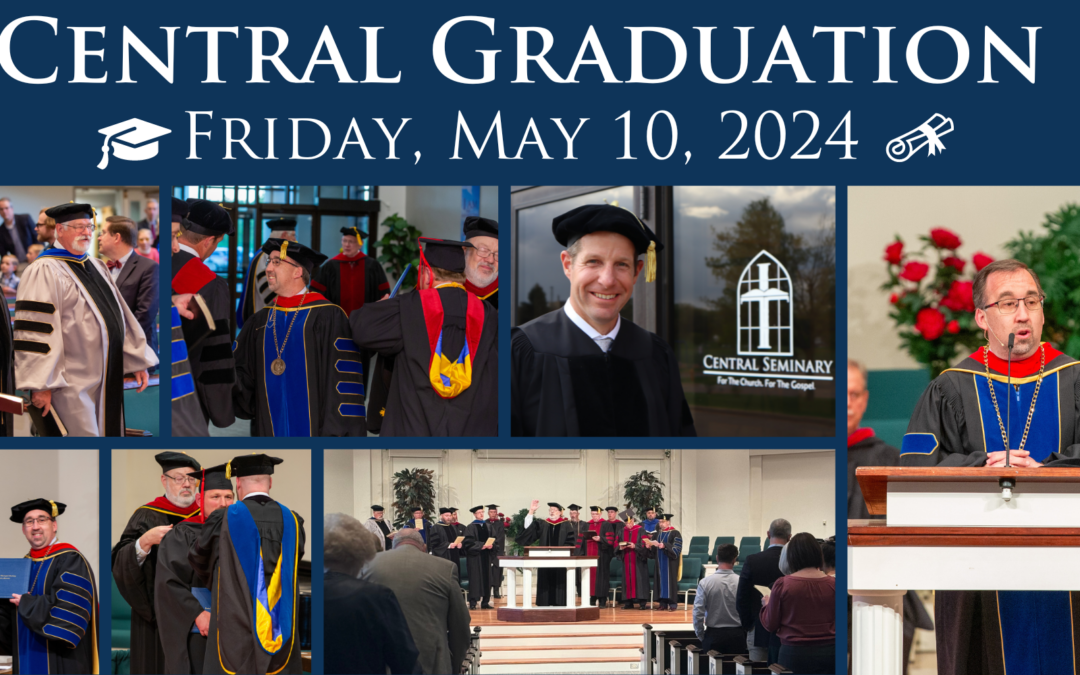
2024 Commencement
Central Baptist Theological Seminary of Minneapolis held its 68th Commencement on the evening of Friday, May 10, in the auditorium of Fourth Baptist Church. Area pastor and long-time faculty and board member Dr. Lee Ormiston was our commencement speaker and shared a challenge to our graduates from Romans 8.
Graduation Pictures
Graduation Video
Diplomas were conferred for the Master of Arts in Biblical Counseling, Master of Arts in Theology, Master of Divinity, and Doctor of Ministry degrees.
The Word and the Testimony
by Dr. Richard V. Clearwaters
Founder of Central Seminary
Isaiah 8:20
To the Law and Testimony
Ever shall be Central’s song;
For within these sacred pages
We have found the Father’s Son.
Of our service He is worthy,
For His form we plainly see,
In the pages of the Volume
Daily witnessed there for me.
Words there great and oh so precious,
Ever speaking loud and clear
To lost sinners, poor and needy,
By God’s nature, now drawn near.
For the hunger that He gives us,
By this Self of His within;
We are pure in daily living,
Through the power He gives to men.
In the world and no part of it,
We will shun its sin and lust;
For the Savior’s image charms us
Through the Book, for us to trust.
In the highways and the byways,
In the halls with noise and din;
Here at “Central” He is central,
Like the Book that brings us Him.

Remembering Chaplain (Capt.) Dale Goetz
Links to articles remembering U.S. Army Chaplain (Captain) Dale Goetz.
In the Nick of Time, “Honor to Whom Honor is Due” – by Kevin Bauder, July 23, 2021
Dale had a reputation as a soldier’s chaplain. The story is that the troops called him the “chaplain with dirty boots” because of the time he spent in active ministry. His goal was to lead three hundred soldiers to Christ and to see ten of them go into ministry. Dale also longed to see Muslims saved. He regularly prayed for them (he even prayed for the salvation of Osama Bin Laden), and he shared the gospel with insurgents.
“Chaplains don’t sit around the big bases waiting for soldiers to come to them,” said Chaplain Carleton Birch, a lieutenant colonel with the Office of the Chief of Chaplains. “They go out to where the soldiers are.”
It is an article of faith among the small community of military chaplains that the job provides great rewards and blessings — but also sorrow, sacrifice and loss.
Maj. Gen. Douglas Carver, the Army’s Chief of Chaplains, in announcing the death of Chaplain Goetz, said of him, “Dale was a selfless servant of God, a devoted husband and father, a strong American patriot, and a compassionate spiritual leader whose love for Soldiers was only surpassed by his firm commitment to living his calling as a United States Army Chaplain.” Lt. Col. Chet Chapman (U. S. Army RET), head of the ACCC’s chaplains’ endorsing agency, has written of Chaplain Goetz that “he served our country faithfully as soldier, pastor and soul winner through eight years of military assignments.”
U.S. Army Chaplain Corps, Facebook Post
Goetz was serving as the battalion chaplain for the 1st Battalion, 66th Armor Regiment,1st Brigade, 4th Infantry Division. The dining facility at Forward Operating Base Walton was quietly and informally dedicated to him after his death, marked by a small sign. Goetz was known to spend much of his time in the dining facility while deployed, getting to know his Soldiers, building relationships and interacting with them. In May 2013, the dining facility was formally dedicated to Goetz, who was “a dirty boots chaplain; he liked to get out there and be with the Soldiers,“ as CH ( LTC) Gregory Walker, 3rd Infantry Division and Regional Command-South chaplain said about him.
U.S. Army: “Dining facility commemorates fallen chaplain” by Staff Sgt. Kristen Duus – June 7, 2013
“It’s a great opportunity to memorialize him so Soldiers and other service members and civilians who go through can see what he’s done and the kind of life he’s lived,” said Chaplain (Lt. Col.) Gregory Walker, 3rd Infantry Division and Regional Command-South chaplain. “He was a dirty boots chaplain; he liked to get out there and be with the Soldiers.”
“We took the opportunity as close to Memorial Day as we could to honor his life, his service and his sacrifice, as well as remember and honor our heroes who have fallen,” concluded Irwin. “His ministry and his impact are not forgotten.”
Farewell to the Fallen: Dale A. Goetz by the Oregonian
“He had always wanted to minister,” classmate Scott Ashby said. “He had a dedication to God and country.”
As much as you comfort us who have gathered here today, we pray that in an even greater measure you will comfort Dale’s family, especially his wife Christy and their three sons Landon, Caleb and Joel. Be for them all that they need you to be just now and continue to provide for them in every way in the days, weeks, months and years ahead that they face life without their husband, father and son.
Central Seminary has a proud history of graduates faithfully serving our Lord as chaplains. The Dale Goetz memorial scholarship reflects our commitment to continue his legacy.
Please join us in remembering Dale’s sacrifice by praying for his family and asking God to call more men to train for chaplain ministry.
Pro Deo et Patria (“For God and Country” – military chaplain’s motto)




